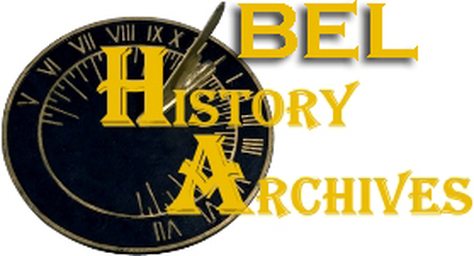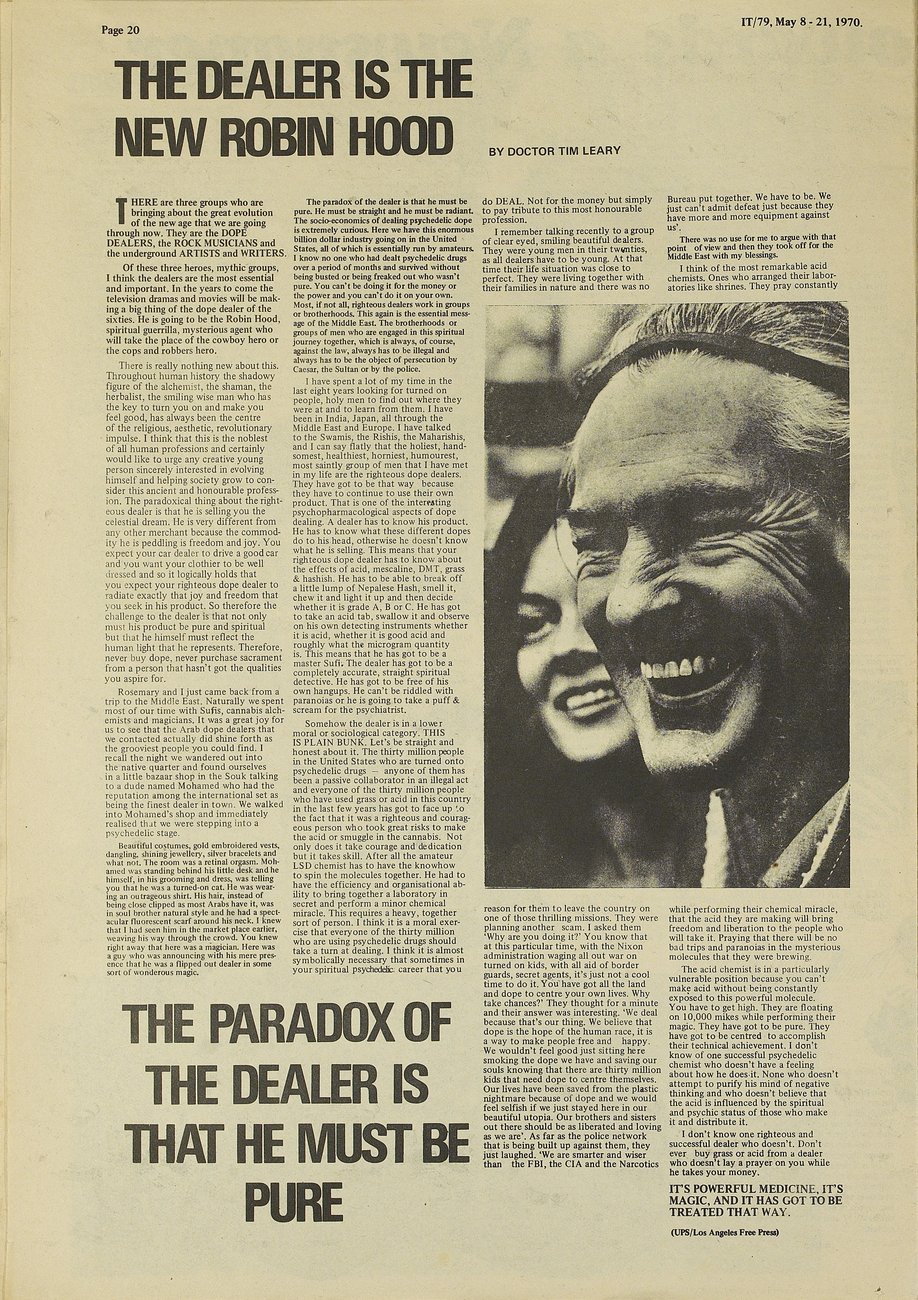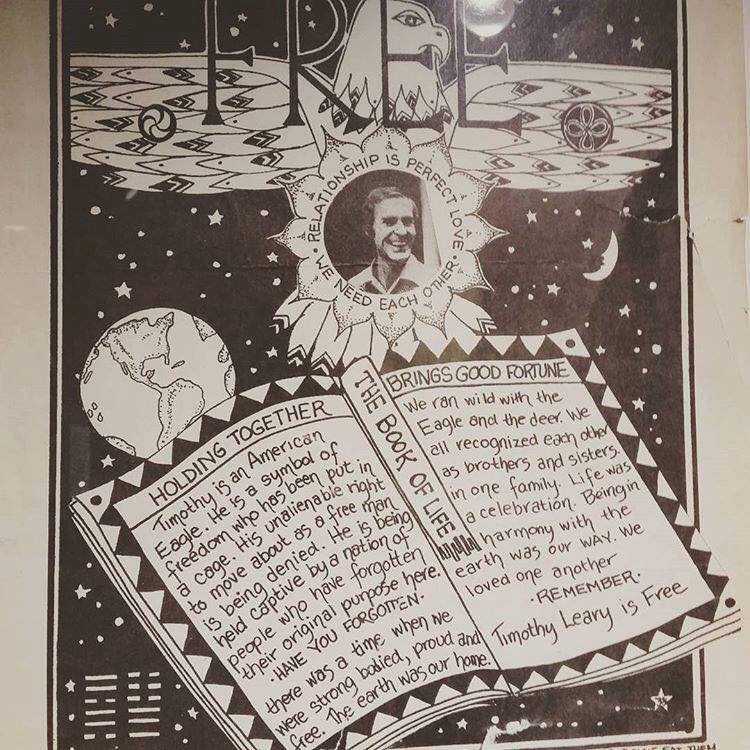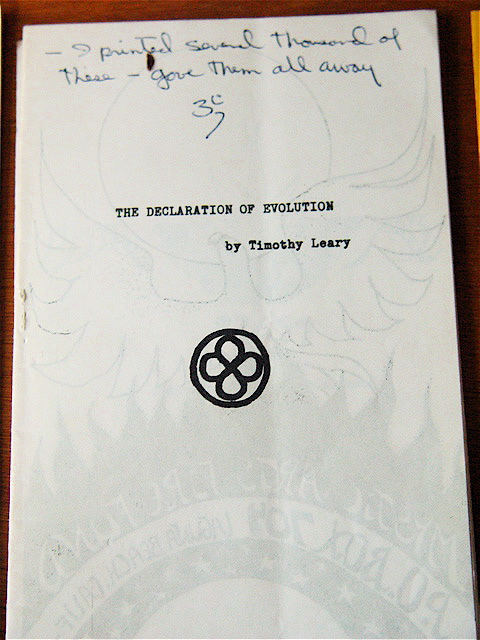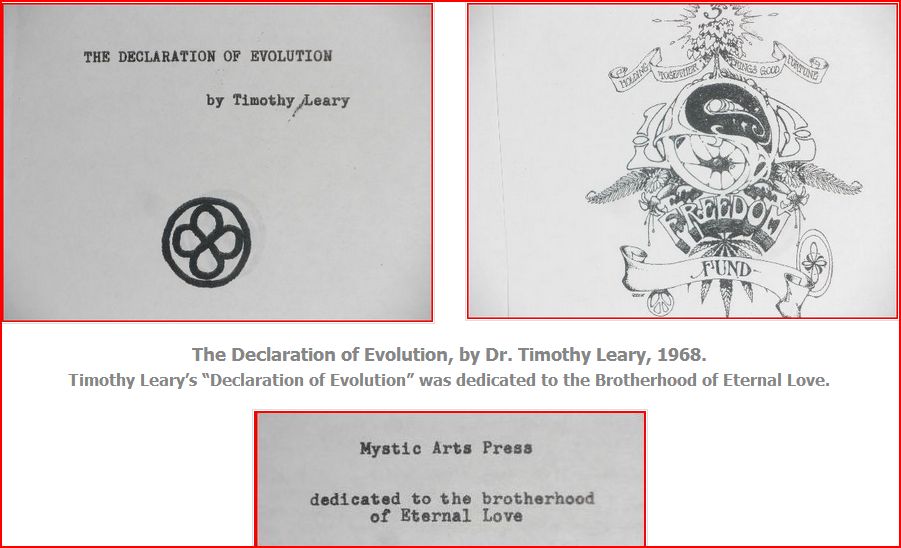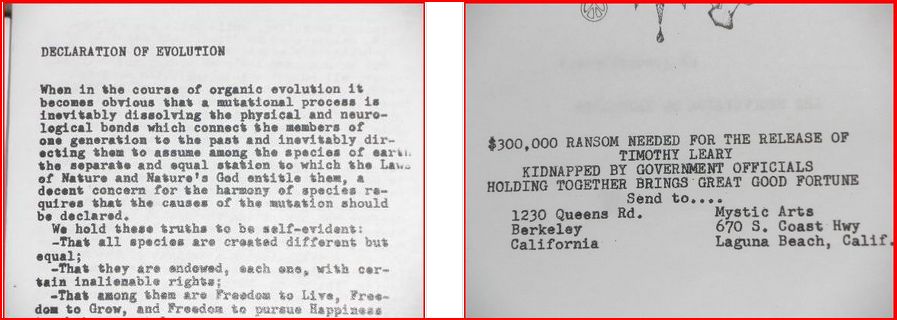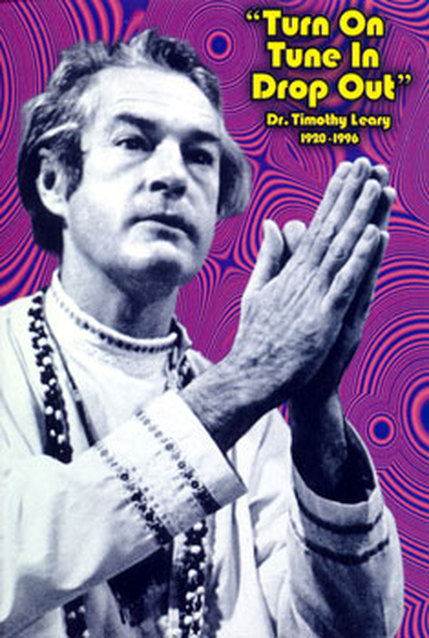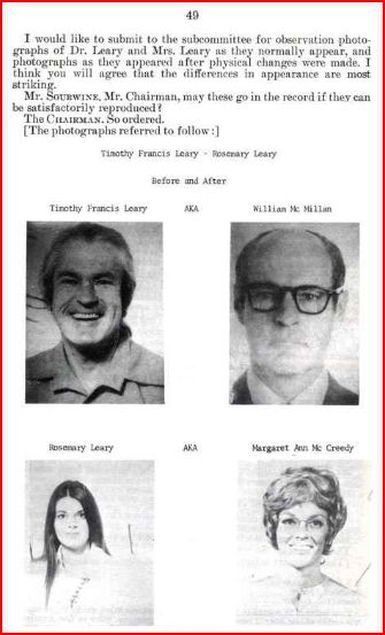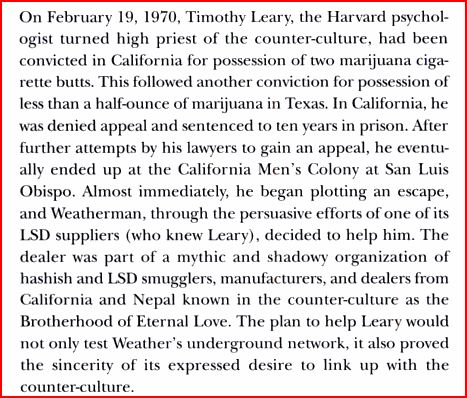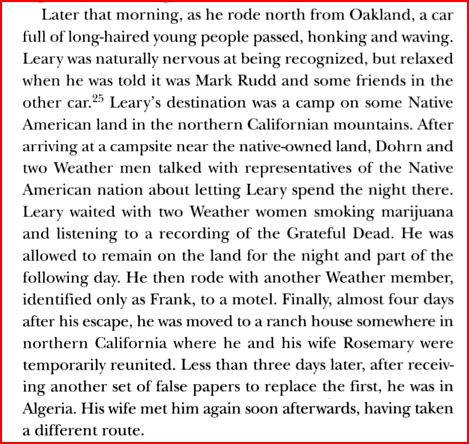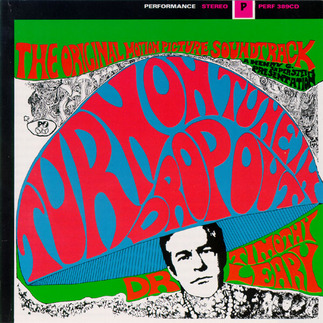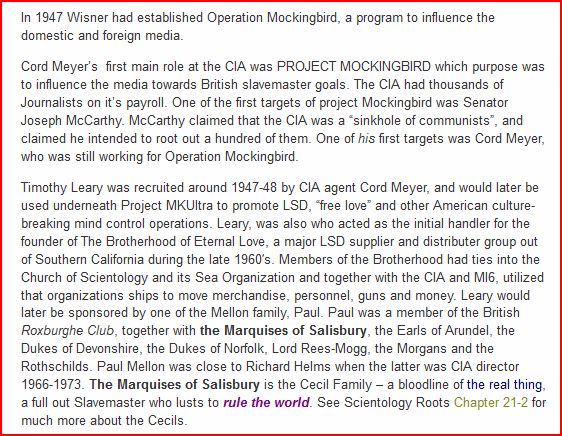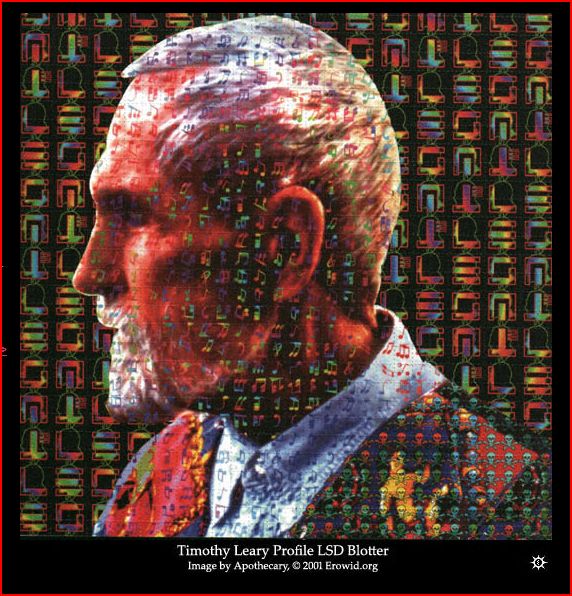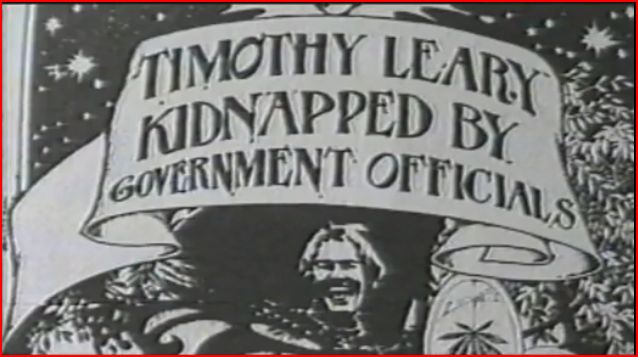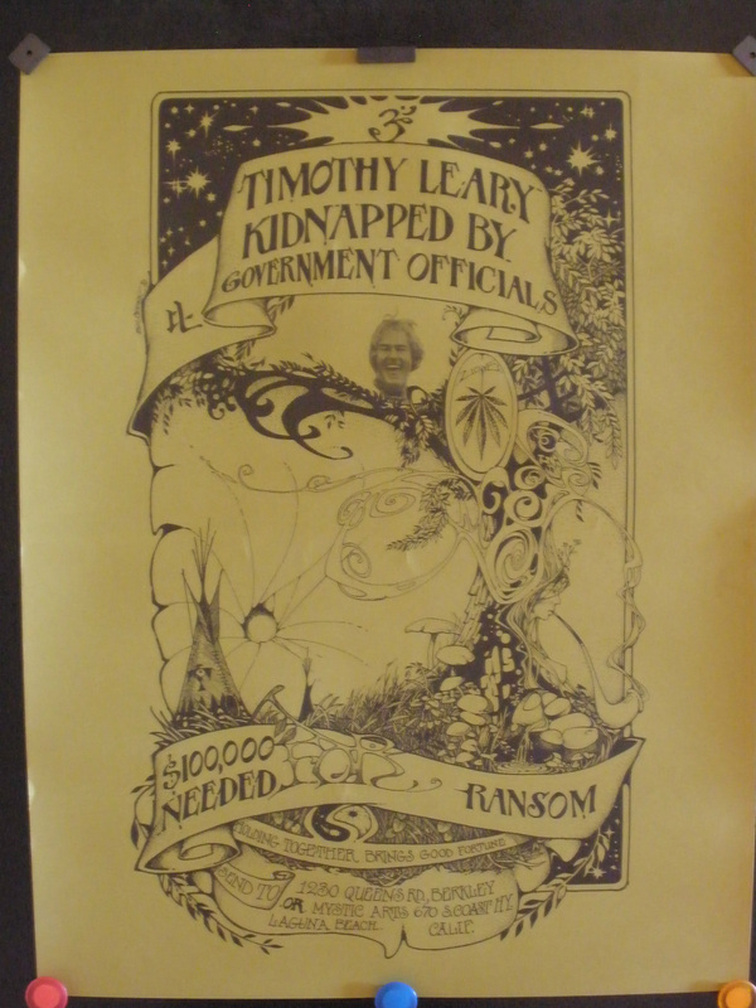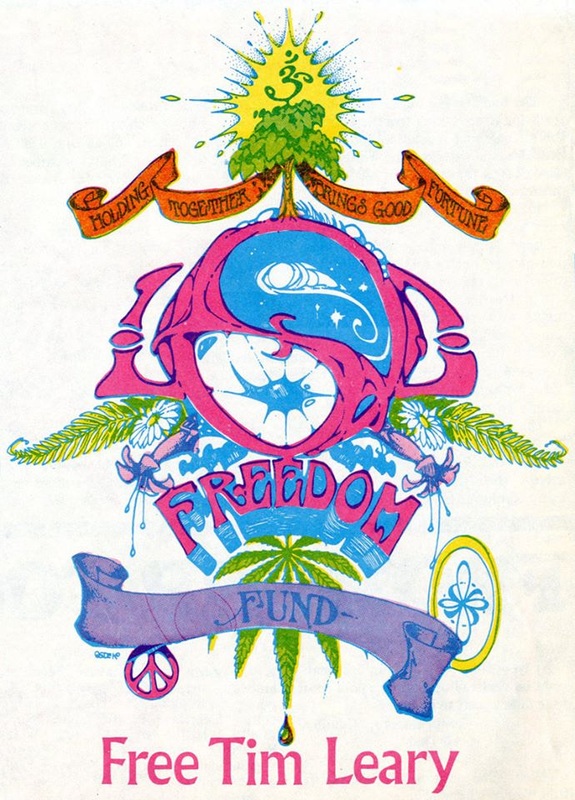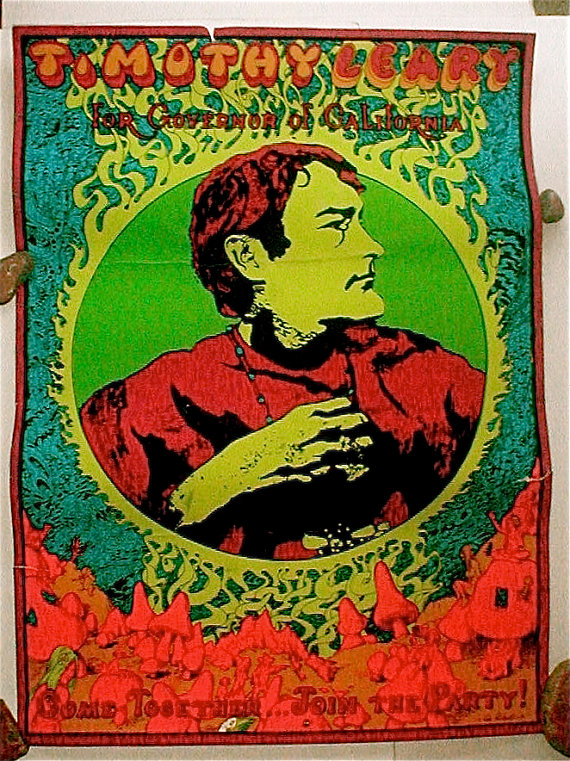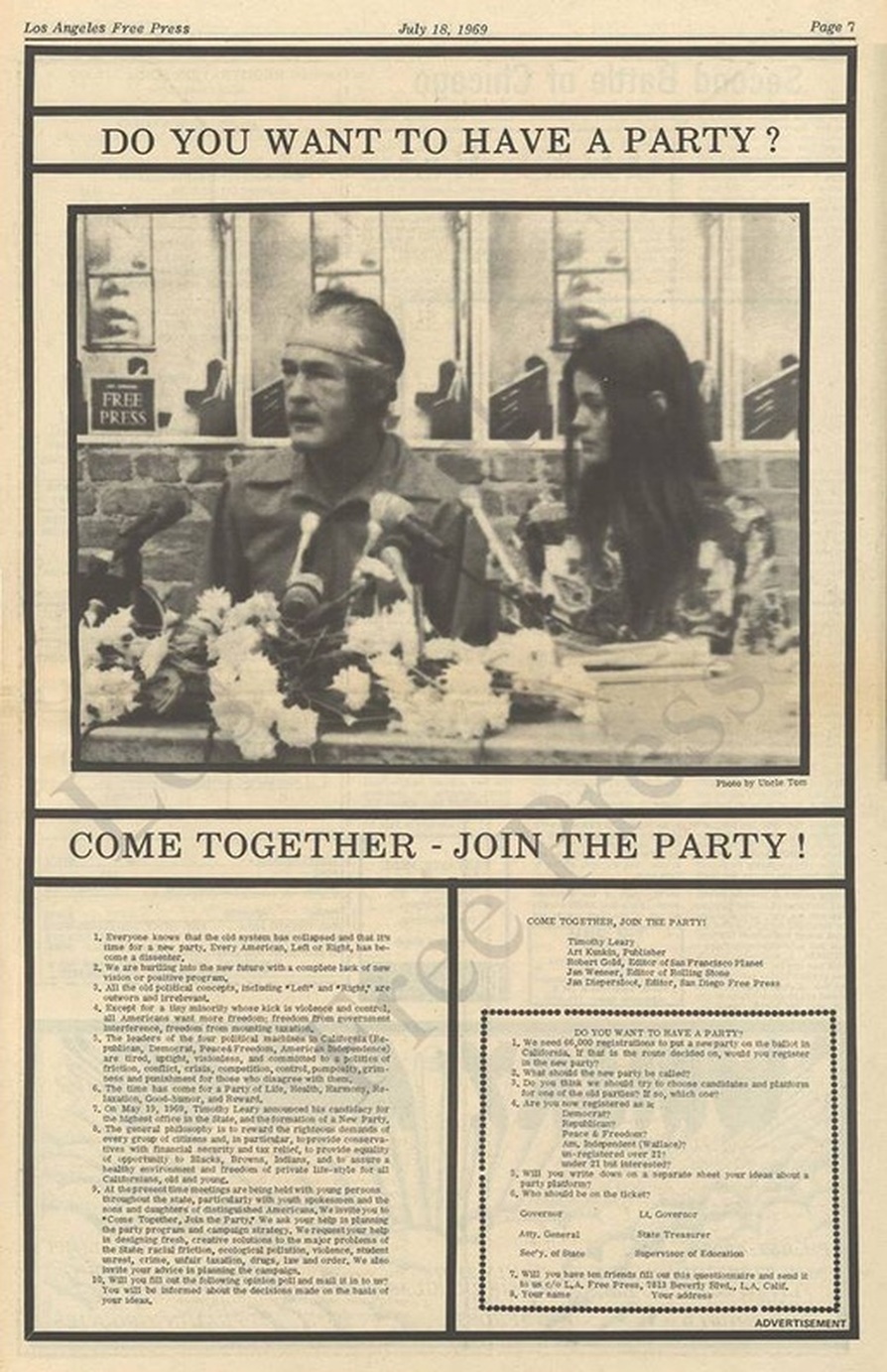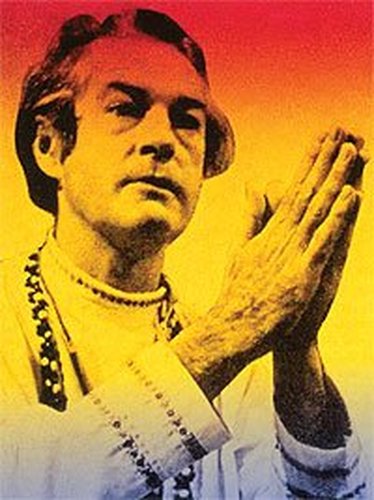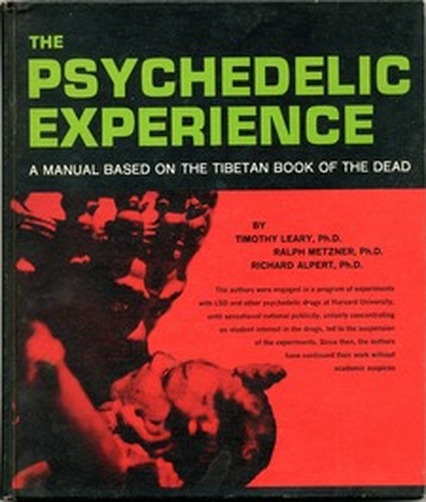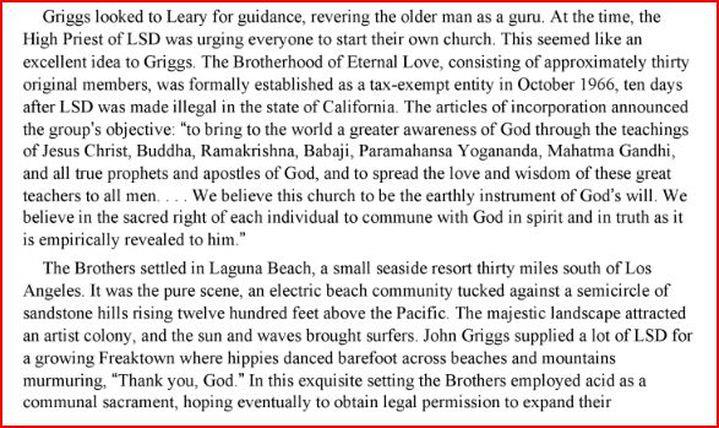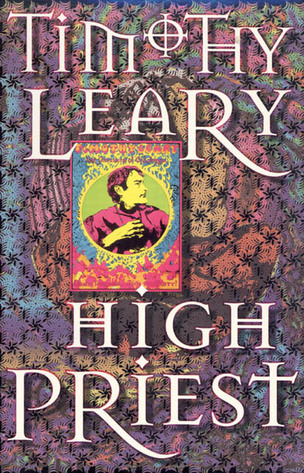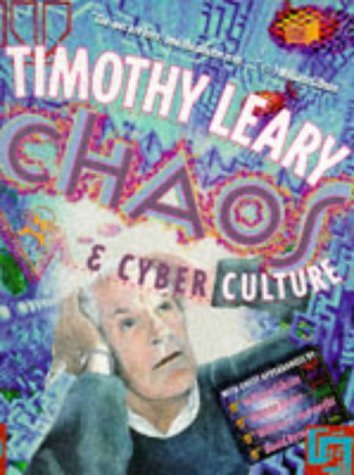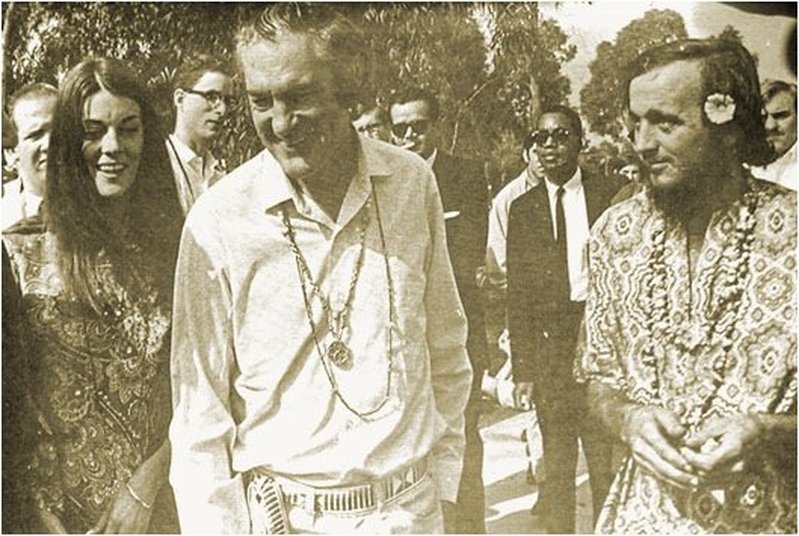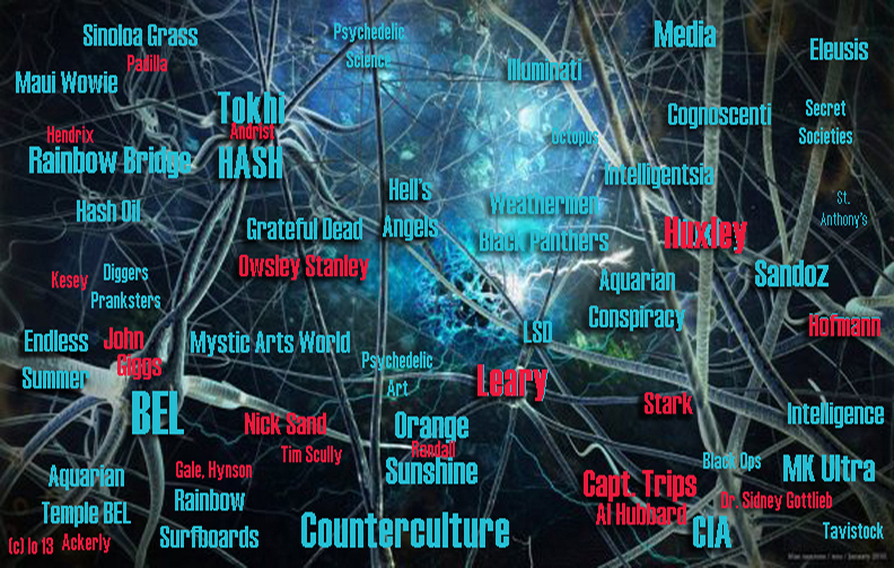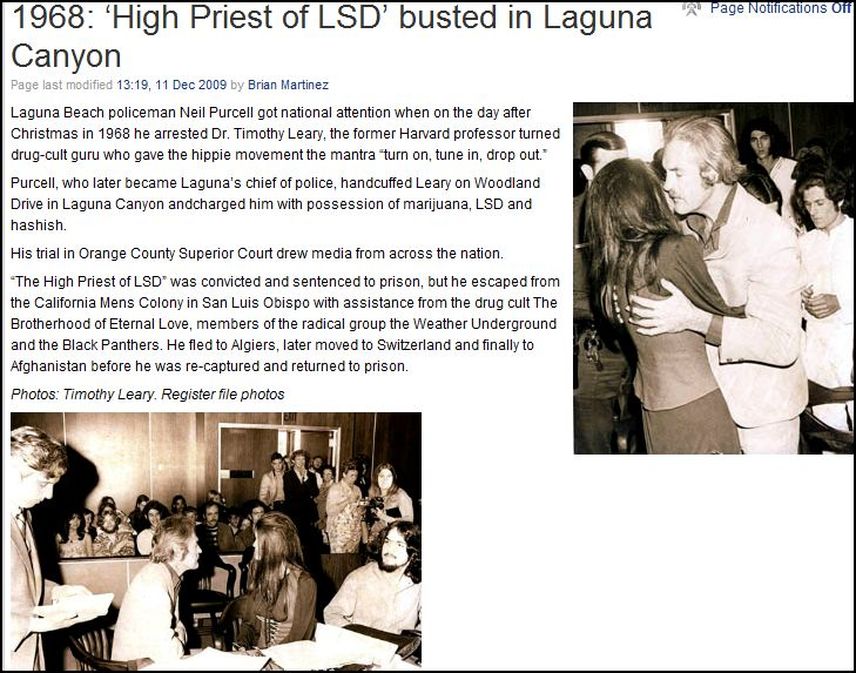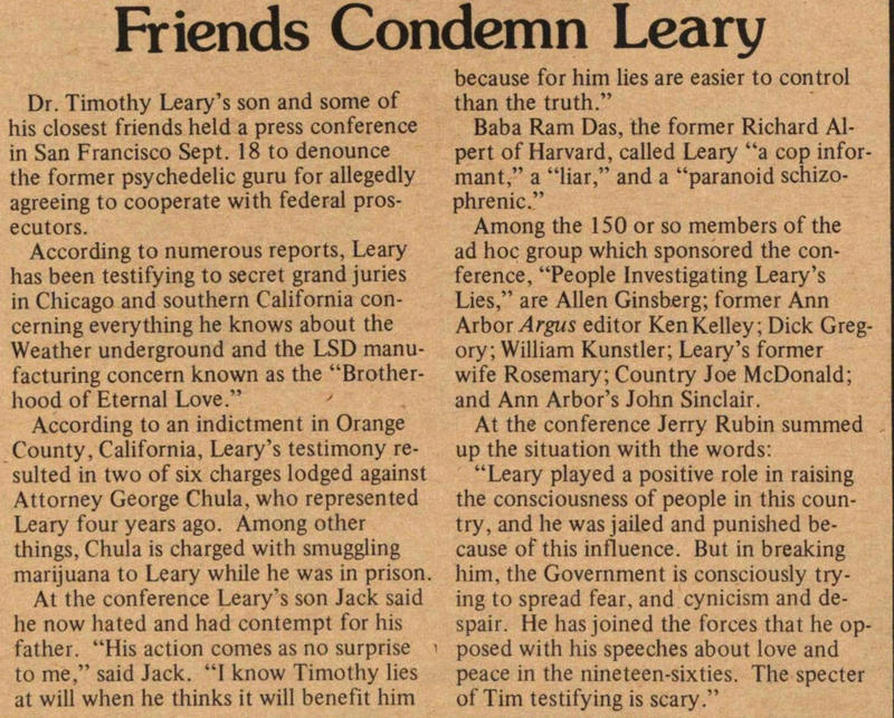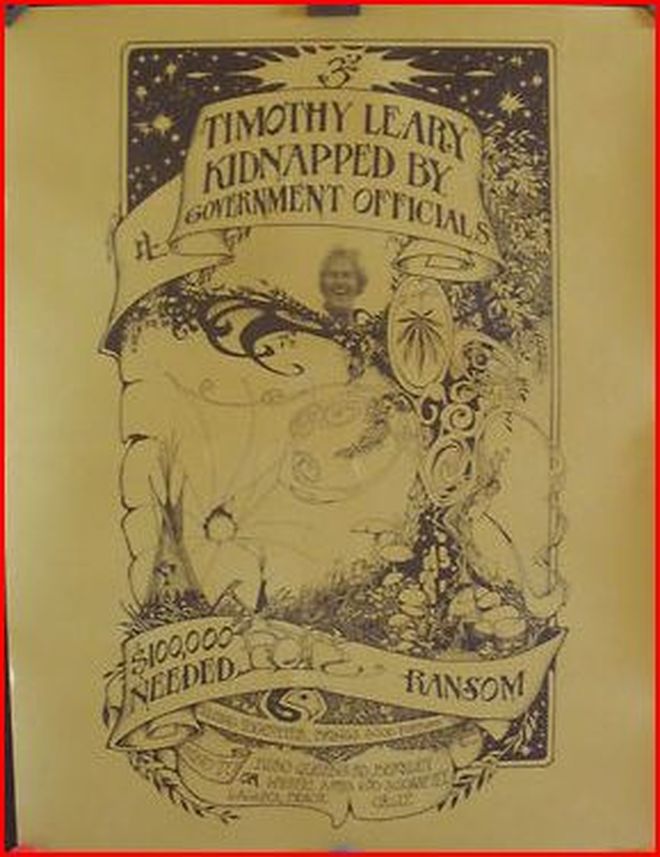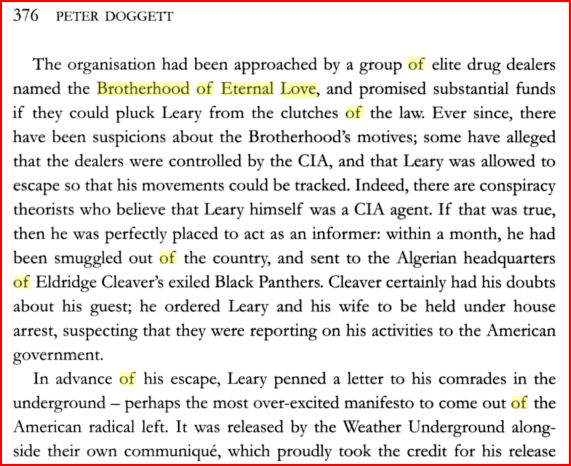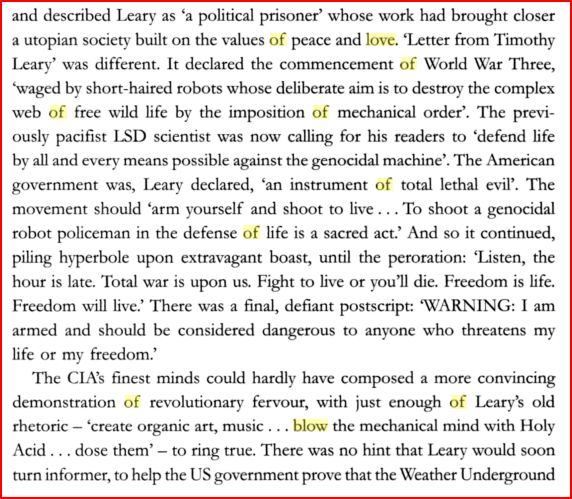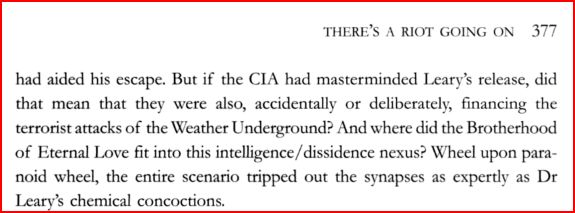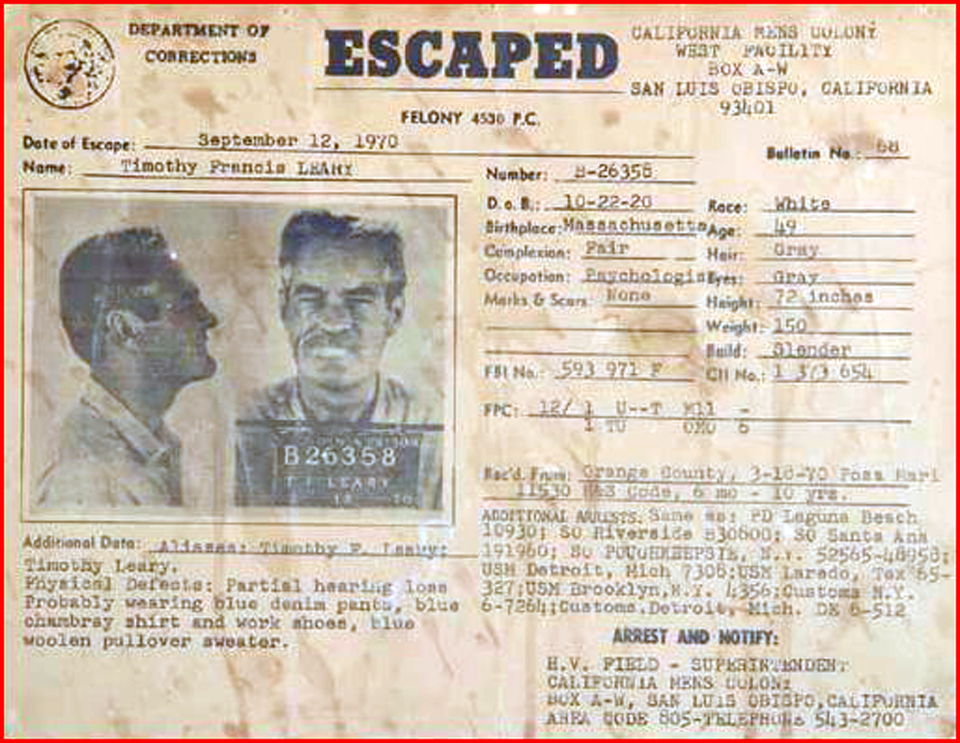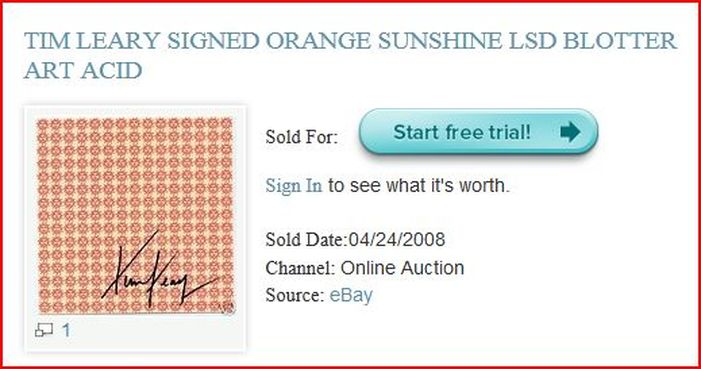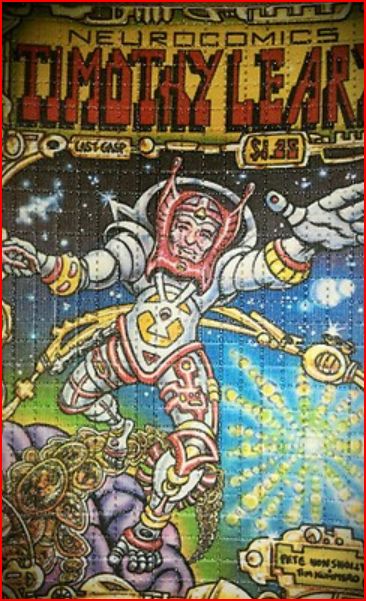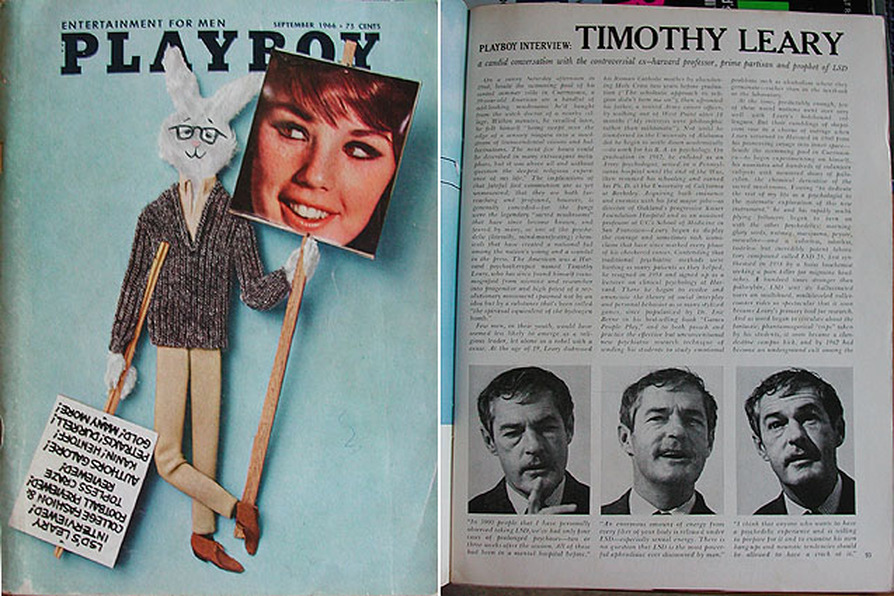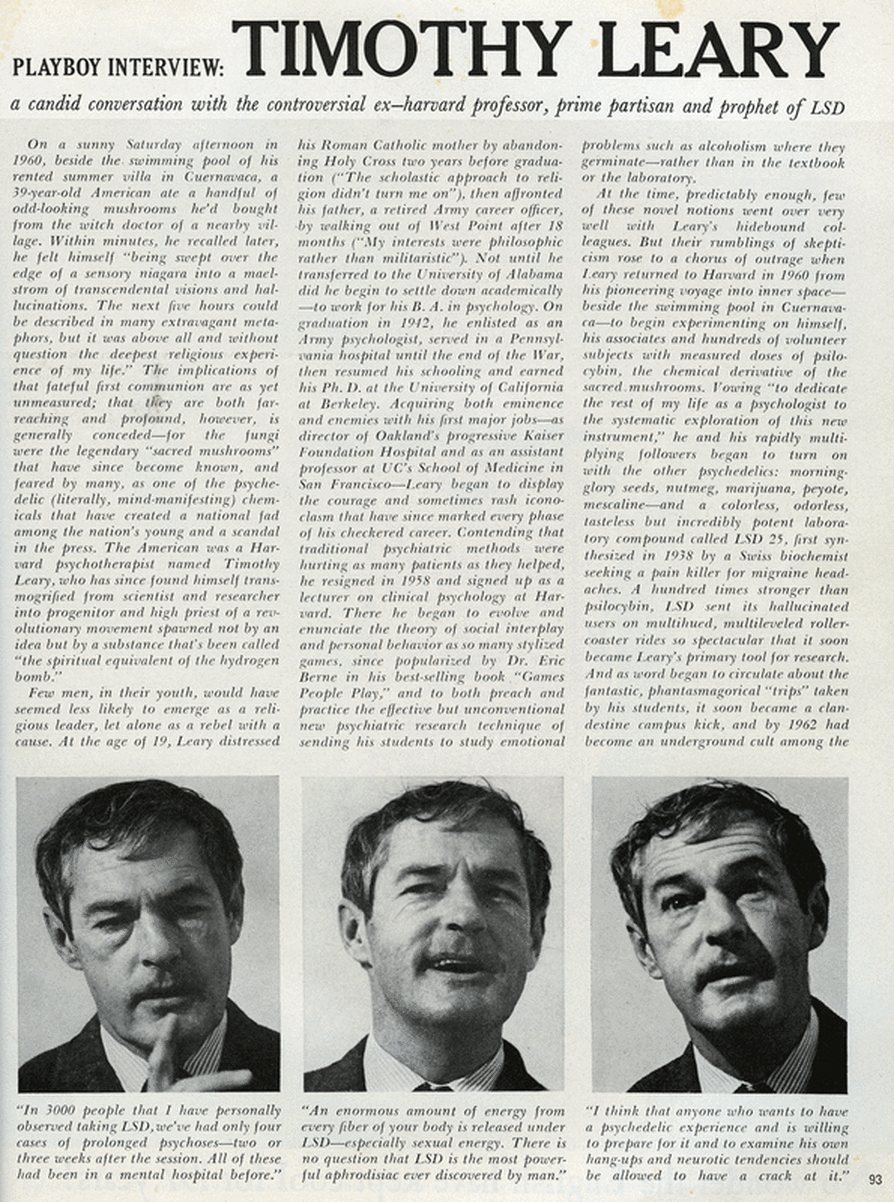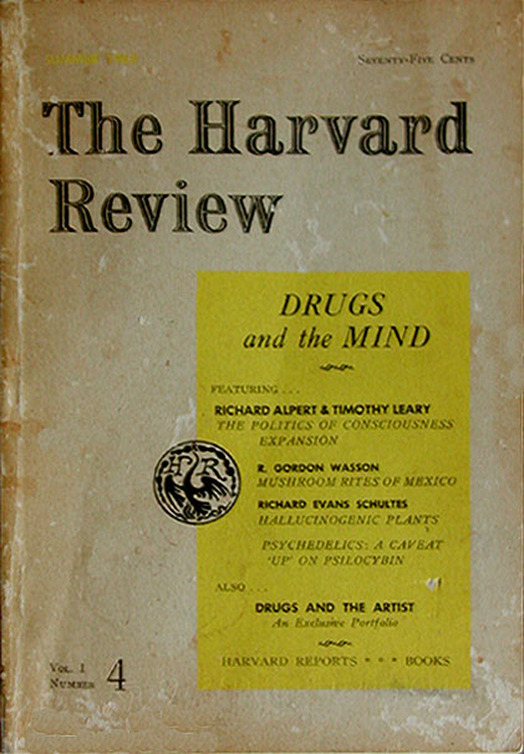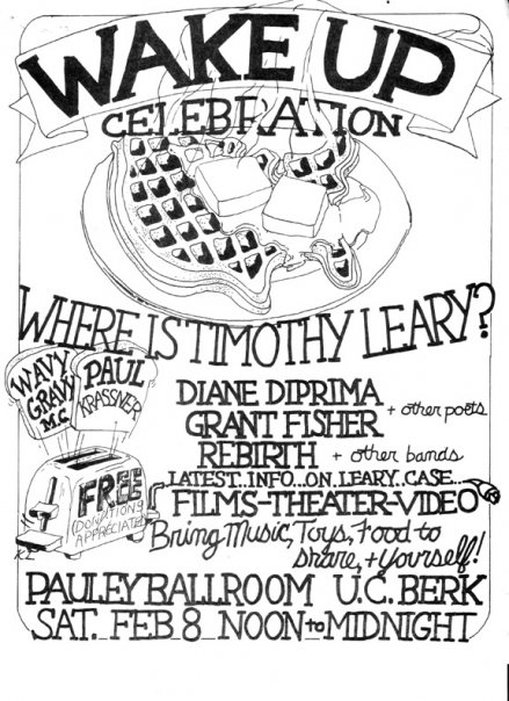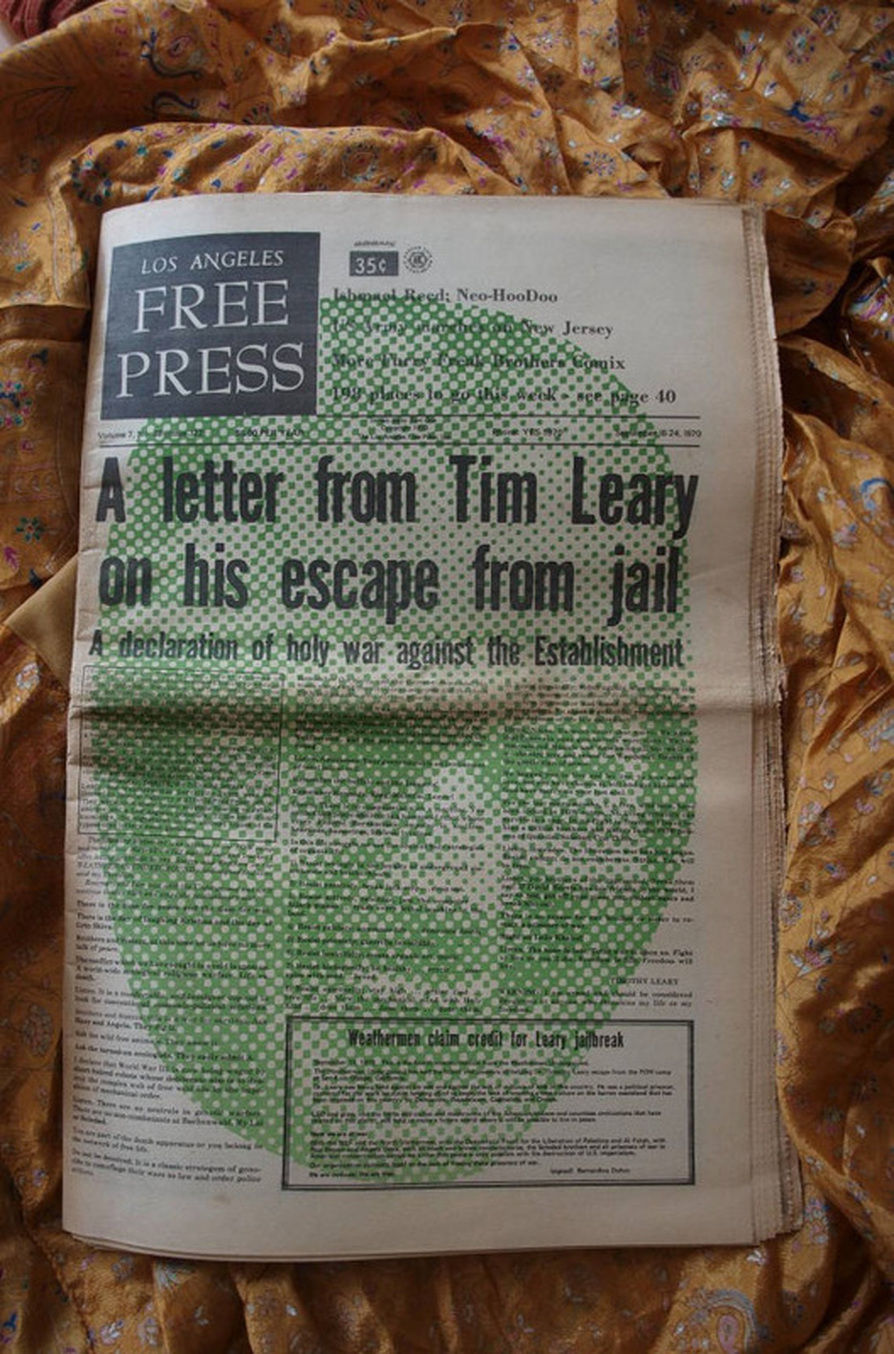Timothy Leary
http://www.internationaltimes.it/archive/index.php?year=1970&volume=IT-Volume-1&issue=79&item=IT_1970-05-08_B-IT-Volume-1_Iss-79_020
Cover of the Mystic Arts Press (Brotherhood of Eternal Love) Edition, 1970
|
|
|
This typewritten 14 page booklet was printed by the Mystic Arts Press and sold through the legendary Mystic Arts World store in Laguna Beach, California in 1970. The purpose of this booklet was to help raise $300,000 bail money to secure the release of Timothy Leary after his 1968 arrest and subsequent imprisonment in 1970. The artwork on the inside “cover” was created by the legendary artist, Bill Ogden with the addresses for donations at the bottom of the page. Page 2 bears the inscription “Dedicated to the Brotherhood of Eternal Love”. This message may be more important and needed today than when Tim wrote it.
"People love to blame Timothy Leary for all the casualties of the sixties drug culture—for all those people who suffered serious mental problems after taking LSD or who later became addicted to other drugs. Gather together a large group of people from that era and you’re likely to find someone who will blame Timothy Leary for the suicide of a friend or loved one. Some of this criticism is unfair. Leary and Alpert, at least in their early years at Harvard and Millbrook, always stressed that LSD should be taken in a safe setting by someone ready to deal with whatever psychological and emotional issues were likely to arise. They were the cautious advocates of psychedelic drug exploration—especially when compared with the scene out on the West Coast, where Ken Kesey and his Merry Pranksters were indiscriminately dosing the crowds at rock concerts and “Acid Tests.” At the same time, it was Leary’s own proselytizing that made him the lightning rod for critics of sixties excess. Leary loved to take the credit—but not the blame—for the drug revolution of the 1960s and ’70s. “Seven million people I turned on,” he said near the end of his life, “and only one hundred thousand have come by to thank me.””— Don Lattin, The Harvard Psychedelic Club
1967-1969:
Leary became personally involved with the lifestyle of the Brotherhood of Eternal Love, a loosely organized group of young people engaged in the importation and distribution of marijuana, hash, acid, and other drugs. BEL incorporated as a spiritual group in 1966 before Leary arrived in Laguna Beach. 'Farmer' John Griggs founded the group, not Leary, which has been widely reported.
The Brotherhood (or the BEL) established a commune in the San Jacinto Mountains east of Los Angeles where Leary became strongly influenced by the styles and energies of this community and the hippie commune movement in general. He continued to raise money for legal fees and living expenses by appearing at public lectures or “conversations”. The apotheosis of this period found him at Berkeley in l969 in which he refined some of his most specific thoughts on ways to utilize the energies released by the psychedelic experience.
1966-l968:
Leary coincidentally had become involved in three drug arrests. One in Laredo, Texas in l965, another at the Millbrook Estate in l966, and the last in Laguna Beach, California in l968.
In an apparent set up, Leary, his wife Rosemary and his daughter were arrested in December 1965, at the Laredo, Texas border station for illegal possession of marijuana. It resulted in a conviction which was appealed and later reversed by the US Supreme Court in l969. The Millbrook arrest yielded no drug charges. The Laguna Beach arrest in 1968 for possession of marijuana eventually resulted in conviction in 1970 and a prison term. While in prison more charges were filed. Leary’s escape from prison in l974 commenced an increasing nightmare of flight as a fugitive through Algeria, Europe and Afghanistan and eventual recapture and imprisonment.
1969:
It appeared that in early 1969, Leary believed he was winning the struggle with the Establishment regarding the right to experience all dimensions of consciousness alternation. After all, the U.S. Supreme Court had recently reversed the Laredo conviction. He was going to run for Governor of California. He had reached counter-culture “Superstar” status.
These Berkeley lectures reveal no particular anxiety or awareness of the prosecutorial and incarceration maelstrom coming his way just months later. He had started planning to run for Governor against Ronald Regan and his relationship with Rosemary was flourishing. He and Rosemary had recorded “Give Peace a Chance” with John Lennon and Yoko Ono in Montreal. This was the year of Woodstock. The counter-culture yearned to know what Leary believed. He was at the peak of his "Johnny Acidseed" period.
Summer 1969: The Brotherhood of Eternal Love produce and distribute an estimated 10 million doses of “Orange Sunshine” LSD (as pills).
Dec 1969: The Rolling Stones Altamont concert ends in tragedy, with 4 concerts-goers killed.
Feb 1970: Timothy Leary jailed for possession of a joint.
Sept 1970: Timothy Leary escapes from prison with the aid of “The Weathermen”. The escape is funded by the Brotherhood of Eternal Love.
1972: The Brotherhood of Eternal Love busted.
1970-l996
After conviction and imprisonment, escape and flight, controversial Leary became notorious, a handy media caricature of a loony who had “fried his brain on acid.” He died in l996.
His prison escape in l974 was engineered by the Weathermen, an urban underground political movement. He was harbored in Algeria by Eldridge Clever, the Black Panther movement’s representative of its American Government in Exile. Once arrested, it was rumored that he cooperated with the FBI to mitigate his prison sentence. He was an instant press headliner, particularly since the U.S. Government had indicted the Brotherhood on drug smuggling charges and had referred to him as The Godfather of the Brotherhood of Eternal Love. No longer could he be perceived as speaking from scientific and academic detachment. He was damaged philosophical goods. He continued, however, to lecture and articulate concepts about human experience which have been widely acknowledged as visionary.
Leary became personally involved with the lifestyle of the Brotherhood of Eternal Love, a loosely organized group of young people engaged in the importation and distribution of marijuana, hash, acid, and other drugs. BEL incorporated as a spiritual group in 1966 before Leary arrived in Laguna Beach. 'Farmer' John Griggs founded the group, not Leary, which has been widely reported.
The Brotherhood (or the BEL) established a commune in the San Jacinto Mountains east of Los Angeles where Leary became strongly influenced by the styles and energies of this community and the hippie commune movement in general. He continued to raise money for legal fees and living expenses by appearing at public lectures or “conversations”. The apotheosis of this period found him at Berkeley in l969 in which he refined some of his most specific thoughts on ways to utilize the energies released by the psychedelic experience.
1966-l968:
Leary coincidentally had become involved in three drug arrests. One in Laredo, Texas in l965, another at the Millbrook Estate in l966, and the last in Laguna Beach, California in l968.
In an apparent set up, Leary, his wife Rosemary and his daughter were arrested in December 1965, at the Laredo, Texas border station for illegal possession of marijuana. It resulted in a conviction which was appealed and later reversed by the US Supreme Court in l969. The Millbrook arrest yielded no drug charges. The Laguna Beach arrest in 1968 for possession of marijuana eventually resulted in conviction in 1970 and a prison term. While in prison more charges were filed. Leary’s escape from prison in l974 commenced an increasing nightmare of flight as a fugitive through Algeria, Europe and Afghanistan and eventual recapture and imprisonment.
1969:
It appeared that in early 1969, Leary believed he was winning the struggle with the Establishment regarding the right to experience all dimensions of consciousness alternation. After all, the U.S. Supreme Court had recently reversed the Laredo conviction. He was going to run for Governor of California. He had reached counter-culture “Superstar” status.
These Berkeley lectures reveal no particular anxiety or awareness of the prosecutorial and incarceration maelstrom coming his way just months later. He had started planning to run for Governor against Ronald Regan and his relationship with Rosemary was flourishing. He and Rosemary had recorded “Give Peace a Chance” with John Lennon and Yoko Ono in Montreal. This was the year of Woodstock. The counter-culture yearned to know what Leary believed. He was at the peak of his "Johnny Acidseed" period.
Summer 1969: The Brotherhood of Eternal Love produce and distribute an estimated 10 million doses of “Orange Sunshine” LSD (as pills).
Dec 1969: The Rolling Stones Altamont concert ends in tragedy, with 4 concerts-goers killed.
Feb 1970: Timothy Leary jailed for possession of a joint.
Sept 1970: Timothy Leary escapes from prison with the aid of “The Weathermen”. The escape is funded by the Brotherhood of Eternal Love.
1972: The Brotherhood of Eternal Love busted.
1970-l996
After conviction and imprisonment, escape and flight, controversial Leary became notorious, a handy media caricature of a loony who had “fried his brain on acid.” He died in l996.
His prison escape in l974 was engineered by the Weathermen, an urban underground political movement. He was harbored in Algeria by Eldridge Clever, the Black Panther movement’s representative of its American Government in Exile. Once arrested, it was rumored that he cooperated with the FBI to mitigate his prison sentence. He was an instant press headliner, particularly since the U.S. Government had indicted the Brotherhood on drug smuggling charges and had referred to him as The Godfather of the Brotherhood of Eternal Love. No longer could he be perceived as speaking from scientific and academic detachment. He was damaged philosophical goods. He continued, however, to lecture and articulate concepts about human experience which have been widely acknowledged as visionary.
The Way the Wind Blew
http://books.google.com/books?id=SD2TvqDh8EkC&printsec=frontcover#v=onepage&q&f=false
http://books.google.com/books?id=SD2TvqDh8EkC&printsec=frontcover#v=onepage&q&f=false
|
From the 1967 Timothy Leary album.
Spoken word, meditational, freeform psychedelic rock music... First 3 Songs: - The Turn on - The Tune in - The Beginning of the Voyage |
From the 1967 Timothy Leary album.
Second set of 3 songs: - Heart Chakra - Root Chakra - All the Girls are yours |
Leary Bibliography: http://en.wikipedia.org/wiki/Timothy_Leary_bibliography
|
|
|
|
|
|
http://www.spiegel.de/spiegel/print/d-41674129.html
DRUGS Russian roulette LSD propagandist Timothy Leary was public relations agent of a drug ring. Mendel with psychedelic drugs was controlled by established businessmen. He has compared himself to Jesus, Gandhi, and Socrates and the "alchemist of mind" been counted. As "sacred group of people," he felt, however, the drug dealers: the noise because of his controversial experiments outcast from Harvard University psychology professor Timothy Leary, 53
Just three years ago, was as Leary escaped under mysterious circumstances from a California prison and sought asylum in Switzerland, intellectuals from many countries made strong in petitions for him. Everyone believed Leary had for its spread in articles, lectures, books, cult practices and records message only honorable unselfish motives.
A trial in San Francisco, hearing of an American Senate committee and research of the New York weekly newspaper "The Village Voice" now brought the truth about Drogenpropagandisten the day: The he led, religiously disguised "Brotherhood of Eternal Love", supposedly a non-profit organization, was one of the biggest has become known narcotics production and distribution equipment, Leary the PR agent for a gigantic business.
Always the underground Messiah had shown the supposedly mind-expanding drugs as a "medium of the boys" and their opponents as "forces of the authoritarian middle-class establishment". LSD, he wrote, would - in a way for friends of friends - "produced in homes and small laboratories." In fact, the illegal trade in psychedelic toxins for many years was in the hands of members of the financial oligarchy.
On behalf of business managers finer origin and best training smuggled the "brotherhood of eternal love" after police investigation for a while weekly hashish and marijuana valued at $ 4.3 million in the United States, stocks for nearly eight million dollars was secured two years ago.
When the U.S. Federal Police in January last year closed the largest laboratories probably the "brotherhood" in St. Louis, she found 50,000 completed pressed LSD tablets and powder for an additional 14 million shares.
Production was discontinued in part by the rockers gang "Hell's Angels", in all parts of the United States and approximately 20 non-American countries: in addition to about 100 other narcotics such as peyote and cocaine, especially high-quality LSD pills with the brand name "Orange Sunshine" the Timothy Leary praised.
With the high finance of LSD professor had already come into contact after him to Harvard University had dismissed the 1963rd For (often paid) nominal rent of $ 500 and Leary found his refuge in the church 55-room castle of the young millionaire William Mellon Hitchcock, then 23, on whose property weitläufigem Millbrook, New York.
Hitchcock was one with annual revenues of between five and seven million dollars to one of the richest families in America, which controls, among other large companies, the Gulf Oil Corporation. Businessmen of his stature, the U.S. journalist Mary Jo Warth had, in LSD "a dream product see: create quick and easy" with low cost, low investment and the possibility of huge profits. "
The financial magnitude of the business itself may Leary might not have been aware. By religious posturing as the foundation of a psychedelic religious community, controversial comments ("LSD is like Russian roulette"), conflicts with the narcotics authorities and sex orgies in Millbrook he considered the product but over years in the headlines.
Measured against this enormous publicity the advertising costs were insignificant. The "Brotherhood" paid in legal disputes Leary defenders and after his conviction to funded (at most) ten years imprisonment by the left-wing underground organization "Weathermen" puts into effect escape from the prison in San Luis Obispo - allegedly with $50,000.
Hitchcock that the unidentified "number one man of all hashish or LSD operations" (narcotics officer Lloyd Sinclair before the Washington Senate Committee) was as the "Village Voice" suggests, is not proven. The prosecutor's office in San Francisco has bought his willingness to testify in the LSD process with the assurance that they have no case against him.
To his close relationship with the drug ring, however there is no doubt. His confidants were next to a Swiss private banker and a temporary chief of the time of Bernie Cornfeld's controlled release "Fiduciary Trust Company" in the Bahamas, the top dealer of the "Brotherhood". Your estimated at $ 200 million profit was partly spent on land and partly in legitimate businesses "washed" (mob parlance) and partly transferred to Swiss bank accounts.
With Timothy Leary's demise, his escape by North African guerrilla quarters, the Swiss Underground and hashish into paradise Afghanistan (where he was arrested in January 1973) also ended the happiness of LSD Syndicate.
After "Brotherhood" messenger in Lebanon and on the Los Angeles airport with 800 pounds of hashish and 100 000 in Switzerland raised "hot" blew up dollars and in Idaho one of LSD manufacturing specific device had been confiscated, the police arrested more than 100 suspects. Part of it was sentenced to prison up to 20 years.
Hitchcock ("It was fun to hear out the establishment in the face") came first in a New York court for tax evasion with a suspended prison sentence for probation · them for five years and $ 20 000. "But you just do not believe," said narcotics officers Sinclair in Washington, "that our investigations have already been completed."
Timothy Leary, the incarcerated for 15 years in the notorious Folsom Prison. According to "The Village Voice" have announced further statements about his connections to the political background and drug ring in mitigation of punishment if he acquires. Recently he stated that after his release he "never again advertise for LSD or other drugs" wants.
|
|
|
The Psychedelic Experience: A Manual Based on the Tibetan Book of the Dead. Co-authors Ram Dass and Ralph Metzner.
|
|
|
In the '60s, Leary was everywhere, including off-Broadway in a show called "Death of the Mind" that was a trippy homage to Hermann Hesse's novel "Steppenwolf"; in the U.S. Senate, testifying about the possibilities of LSD; in pop songs by the Who, the Moody Blues and the Beatles. By 1970, Leary was serving a 10-year sentence for pot possession in a California prison. Aided by the Brotherhood of Eternal Love, major distributors of LSD in the western United States, and the Weather Underground, he escaped and fled to Algeria, where he lived in exile with the Black Panthers, before heading out for Switzerland and Afghanistan. Three years later, he was back in prison, temporarily housed in Folsom next to Charles Manson, who told him, "I've been waiting to talk to you for years." http://www.washingtonpost.com/wp-dyn/content/article/2006/06/14/AR2006061402139.html
Released in 1976, Leary seemed to be an anachronism, a Wild West outlaw whose time had come and gone while behind bars. Certainly that seems to be Greenfield's take, as he compresses Leary's final two decades into the shortest section of the book. While there's no question that Leary ceased to be a pop cult superstar, he remained a vital and visionary guide to a bleeding-edge "transhumanist" and "extropian" future, using the acronym SMI2LE to summarize his interests in "space migration, intelligence increase, and life extension." He was an early champion of not only personal computers but also the Internet and its potential for new forms of community and individuation. Never too comfortable with politics (he dismissed student activists as "young men with menopausal minds" and proclaimed that LSD stood for "Let the State Disintegrate"),
Released in 1976, Leary seemed to be an anachronism, a Wild West outlaw whose time had come and gone while behind bars. Certainly that seems to be Greenfield's take, as he compresses Leary's final two decades into the shortest section of the book. While there's no question that Leary ceased to be a pop cult superstar, he remained a vital and visionary guide to a bleeding-edge "transhumanist" and "extropian" future, using the acronym SMI2LE to summarize his interests in "space migration, intelligence increase, and life extension." He was an early champion of not only personal computers but also the Internet and its potential for new forms of community and individuation. Never too comfortable with politics (he dismissed student activists as "young men with menopausal minds" and proclaimed that LSD stood for "Let the State Disintegrate"),
Mr. SouRwiXE. Now, you have touched upon the escape of Timothy Leary, although not in great detail. He tells the story quite fully in his recently published book. "Confessions of a Hope Fiend." Have any of you read it ?
Mr. Straxge. Yes, sir.
Mr. Sourwixe. You have read it. As far as you know, did he tell the truth?
Mr. Strange. Yes, sir.
Mr. Chairman, may a passage from this book telling how he shimmied across a telephone cable and above the level of the prison lights and climbed down a pole, and so forth, be put in the record at this point ?
The Chairman. So ordered. [The information referred to follows :]
[From Confessions of a Hope Fiend, Bantam Books]
(By Timothy Leary)
Slowly picked my way to the roof end looking down over road, fence, compound, and way below car lights on the highway. I sat down and laced the right sneaker.
The socks in my pocket. I put on the left sock and tied the sneaker. Pulled on handball gloves. I lay down on the angled roof just under the cable. Grabbed it with hands, and hooked ankles. I reached my hands above my head and pulled out on the wire.
It was hard going. The cable had wire looped every ten inches holding a tele- phone cord below. My legs bumped and tangled in the wire. There were no smooth easy sweeping pulls. Reach hands. Pull body ten inches. Pull leg. Hands up. Pull body. Haul legs. The cable bouncing and swinging. A strain to hang on. Wrenched my hands. Strain legs. Weird wrestling motions, my body clinging to the swaying wire. Sweating. Heaving awkwardly. After fifty pulls — a pause. Horrid discovery. Completely exhausted. Lungs gasping. Arms drained of energy. Body limp and weak. Can't go another foot. Only one-third across the wire. Hadn't even reached the road. The wire was longer than expected. Two-thirds to go. Exhausted. My hands can't hold the weight of my body. With desperate sexual writhing I embraced the cable with elbows and knees. Rested. The cable was slowly swinging. Nightmare thoughts. What are you doing this time? Inefficient wizard dangling from a cable twenty feet high escaping from life imprisonment in full view of two gun trucks? Once again the little experiment has gotten out of hand. Professor. Turned my head horizontal toward the gun truck. The interior light snapped on. He's seen me. Put on light to sound alarm. The word is flashing. I'm pendant waiting for patrol cars to scream up. Will they poke me down like a wild raccoon with sticks? Dangling, I had to laugh.
Dangling from a sAvinging wire I start squirming toward life. Five more wrenching feet. Stop. Wrists and arms exhausted. Panting. I .should have quit smoking. I .should have pushed more iron. It seemed .so easy. Now I know why no com have escaped this way. Olympic gymnastics on a high wire in the gunsights. I should have waited until the winter fog. Maybe they leave the cable strung over the fence as a trap? They're hunters waiting in trucks, rifles cradled on knees, waiting for wild animals to blunder into the ambush? The slaughter
hole. My hands trembling could hold no more. With desperate lunge I hooked elbows over the wire, with clumsy crablike grabs pulled slowly along by elbows. Stop to rest. Look down at macadam road sixteen feet below and over into TV rooms where cons watch the shadow tube.
A sudden glare of light. Forty feet away a patrol car slowly turns from the compound road toward me. I'm captured. The auto rolls closer, a soft crunch of tires on gravel. My blue denim arms turned yellow in the headlight. I looked down directly at the guard leaning over to crush his cigarette in the ashtray. Car rolled by to the comer and disappeared.
Now tumble into some delirious trance. Arms crossed, elbows hooked to wire Inching caterpillar crawl. All hope of escape given up. My only goal to reach the fence so I'd fall to freedom outside the i^erimeter. I must remember when I fall to let feet go first. My hand kept getting tangled in the phone wire loop. A com- pulsive wrench to free my hand sets the cable bouncing wildly. Mouth gasping, face bulging, glasses t\visted, sweat dripping, face grimacing. Another skin of the teeth. I wanted Errol Flynn and out came Harold Lloyd. I felt very alone. Forty-nine years and 325 days of this life built up to this moment of ordeal. My life hung on a needle point. In trance of Sun Dance initiates whirl suspended by hooked burning pain in the chest muscles. There was no fear only a nagging embarrassment. Such an undignified way to die, nailed like a sloth on a branch ! Other men and women in prison would be pained by my failed escape. My fall would please the guards. See we told you. You can't escape. There is no escape.
No more thoughts. From some inner reservoir of JIVE ! LIVE! LIVE! SUR- vrv^E ! came an energy flow and a curious erotic lightness. Hands reached up in easy strong pulls, legs kicking, body wiggling, arms flailing, shoulders pushing propelled by uterine squeeze. My glasses fell but my arms smoothly reeled cable. Thus I butted head first dripping wet into this New Life.
Hand over hand till fingers hit the pole. Hanging by my legs (I'd practiced it a thousand times in my bunk) I reached right hand over head, grabbed metal spike, dropped legs, twisted body, wrapped legs around splintery wood, silid I was swaying sweating panting. I saw the glasses lying on ground outside of fence. I adjusted them on my nose, funny professor gesture. I looked around. All silent. Electric lights shining on the steel fence and the green grass. Cell- blocks forty feet away shining still in the night. No motion.
I staggered to the wall, slid down, lay head against the stone, drained, deeply breathing, listening. Alert fox hiding from hunters, waiting for pursuit cars to scream down road. Silence. I started down the bank. The barracks of the open-prison compound lay scattered below. Lights were on. Watch for fire patrol. Steep decline. My first steps dislodged a rock avalanche. I slipped and slid, stones rattling aVound me. Hit the hill bottom and started loping carefully, probing, wary like a kickoff return.
♦ ***♦♦*
Up ahead I saw the dim outline of trees next to the highway. Climbed out of the culvert and ran to the first tree. Standing five feet from highway at the base of the second tree, I saw three trees joined at the root trunk. Well, they have the symbols right.
A long wait for the pickup. Scanning the cars roaring by. Two minutes. Five minutes. Ten minutes.
A car is coming. Right blinker flashing. It pulled up in front of the tree. I ran from the shadows. The car door swung open. A girl with long dark hair leaped out. Code words swapped.
—Kelly !
^Tino!
We embraced. I ducked into the back seat grabbing the hand of the blond girl behind the wheel. Kellv jumped in slamming the door. Motor gunned we roared off.
— I'm Maru, said the driver.
—Where is She?
— In Denver waiting for you. You'll .see Her Monday.
I had mixed feelings. I hoped She was out of the country safe but exultant we'd meet in two days.
Kelly was talking fast.
— Brother, we're glad to see you ! We made two passes by the pickup spot. We were worried. You were late. I was going to start walking back the tracks to look for you. In case you were hurt.
Kelly pointed to the back seat.— There's a new set of clothes. Change. I started stripping off prison denim.
—Give them to me, said Kelly.
— I'd like to save them. For Barker and Horowitz the archivists. — No. We're going to transfer your clothes to another car. They'll drive south near L.A. and leave them in a gas station re&troom. To maUe the pigs think we're heading south. — How many cars do you have operating tonight?
Four. You'll only be in this car for five minutes. We have a camper in Morro Bay to take you to Oakland. A third car goes south. And the fourth has the shortwave set to monitor police calls. Hotv much of a lead do we have?
— I don't think I was seen leaving. So we have two hours before they discover I'm gone.
Maru was driving smooth and easy. In four minutes we reached a road by the beach. Car stopped. Maru turned back grinning. — OK brother. You get out now. I'll see you in Oakland.
I pulled the knit ski cap over my head and followed Kelly out of the car over the sand dunes down the beach. It was still a B movie, spy thriller, World War II.
After a hundred yards Kelly turned away from the sea, over dunes to a parked camper. A beautiful woman waited. We kissed. A sturdy gray-haired man came around the side of the camper and we shook hands.
— Welcome.
Kelly motioned me in back of trailer.
— I'm going to dye your hair now. A strange trailer just pulled up. They look suspicious. We don't want to pull out suddenly. We'll hang around here for a few minutes and then hit it.
I sat on the edge of the bunk bed. Kelly standing at the sink filling a pail of water. She squirted spray-can hair dye on my scalp and began massaging. After a while she stopped and smiled.
Kelly is my code name, not my real name. I'm not always a beautician. My father is Senator and the name of our tribe is the Weathermen Underground.
I began to laugh. It all figured. The maniac reckless guerrilla tribe. Scourge of the FBI.
— We had to keep it secret. We hope it's all right with you.
I suddenly flashed on the meshing of underground energy systems. Dope dealers raise twenty-five thousand dollars to finance the breakout. And the bread goes to the maniac guerrillas.^
— The twenty-five thousand went to buy dynamite? Kelly laughed.
— Dynamite, hair dye, and fast cars.
TIM LEARY AND THE PINK POWER PILLS
http://ionamiller2008.iwarp.com/whats_new_24.html
A Friendly Account of an Infamous Year at Harvard, by Anon. New Man
In September 1960 I was a young poet newly arrived in Boston with my wife who had a fellowship to Harvard. I quickly lucked into a job one night a week as the attendant at the desk of the poetry room at the Harvard library, and I got free-lance editing work at a good publishing house, Beacon Press. I called my friend Ben, a savvy mentor who lived in Berkeley, California. Ben said he was suffering in Berkeley but he had two friends who had just arrived at Harvard, Tim Leary and Frank Barron, and Tim had a big house in Brighton.
Ben said that Tim might invite Ben to stay in the large house. Ben said that Tim and Frank were transpersonal psychologists from the psychology department at Cal Berkeley that were experimenting with a powerful new drug at Harvard. Ben gave me Tim's phone number. I called and found that Tim did think highly of Ben. Tim said that if I got Ben an airplane ticket to Boston, he could stay in Tim's house and maybe help with the drug experimentation. I was glad I was able to help Ben fly into new horizons, where I myself had just landed.
Within two days Frank Barron drove over to the apartment where Ann Rower and I lived on Beacon Hill, to visit a little and then to go to the airport to pick up Ben. Frank's wife Nancy was with him, a tall beauty Frank had met when she was a show girl in Las Vegas who came from a family steeped in academic anthropology. Frank was considered the world's foremost expert on creativity. He had interviewed T.S. Eliot, William Butler Yeats, and other prominent artists to study the creative experience (See Appendix: Frank Barron, by Michael Murphy).
Frank told me about a remarkable experience he had the night before with the drug they were trying to study. He described going head on into death and through it, remaining aware. I figured it could be an enlightenment experience or a drug high or both. As we discussed Frank's experience from the night before I was sitting in front of the live fireplace, working the flames. Something paranormal and silent happened between Frank and me and the flames. The trip was on.
On the way to the airport I learned that Tim had been shocked profoundly back in the spring when his wife committed suicide, leaving him with their two children, a 13 year old girl and a boy of 11. On the way from Cal Berkeley to Harvard that summer, Tim, his children, Frank, and Nancy vacationed in Mexico, at a rented Villa, for a month, and there Tim and Frank ingested large amounts of the famed psilocybe mexicana mushroom and had breakthrough experiences. Tim began to write a lyrical novel (which he once showed me).
Then, by a golden stroke of history, they learned that Sandos Pharmaceuticals had just synthesized the agents in the psilocybe mushroom into a pink, sugarcoated pill, bound to have a powerful effect on the mind.
Tim took to the phone and locked a deal with Sandos to be given a large stock of the drug to experiment with at Harvard. Sandos was so happy. Tim and Frank were rocking. They arrived at Harvard in early September and cases of power pills arrived quickly thereafter, about 2 weeks before I met them.
We got Ben at the airport and drove to Tim's big house in a Boston suburb, and there I met Tim. The scene had been designed by central casting with consummate genius. We went into a very large and comfortable living room. Ann and I sat on a couch near Tim and Frank. On a round table in front of us was nothing but a plastic drug container filled with small pink magic pills. On a couch across from us lay a human being, seemingly holding himself stretched out in tension, his arms at his sides. "Who's that?" I asked Tim. "That's the chairman of the Harvard psychology department," said Tim. "He's having a bad trip."
I had opened the container and spread out some of its hundred pink pills that felt like a potent psychotropic agent, used by shaman and seers of Mexico to access super-reality. The mushroom is called the Flesh of God, I was told. I asked Tim how many pills the guy took who was laying there fighting the experience. Tim said that was 2 pills. I asked Frank how many pills he had taken the night before to experience death and awareness. Frank said two. Without hesitating I took 12. Tim and Frank were amazed. Ann took two pills. I was sitting cross-legged on the couch, and there I stayed for hours, unmoving. Ann sometimes sat beside me, sometimes hung with Tim, Frank, and Nancy. Across from me the professor laid out flat, tense and unmoving, for hours, and I sat cross-legged on the couch, hour after hour, silent, smiling, in open awareness, and having a very good time.
From time to time Tim or Frank would gently come up to me with clipboards, pens, and paper, seeking reports. I smiled at them knowingly, remaining silent. Finally, after several hours, the young poet spoke. I said something like I'd been experiencing the understanding beyond understanding. Ann also had a good trip on her 2 pills. Tim and Frank and Ben all seemed happy with Ann and me. We had done well on the superdrug.
At my request, Tim gave me a plastic container of 100 of the pink power pills to take home with me to experiment with. Score that for poetry. Can't beat that as a first meeting with Tim. I smoked marijuana, and was hip to other traditional drugs, but these pink pills took drug taking into new ground. Tim and I were to become friends, and that house had many memorable gatherings that storied year.
About 7 days later I had my first scheduled session to be attendant at the desk in the Harvard poetry library. I ate six pink pills, took a big stash of paper and a few pens, kissed Ann goodbye, and went off to work, through public transit to Cambridge, confident that I could extend the English language, right there in the hall of poetry at Harvard, on my very first night on the job.
The drug hit just about as I started up the steps into the library. Someone who worked there showed me the desk I had to sit at. I sat down and assumed command. No one bothered me for the 6 hours of my shift, and I wrote 55 pages of excited poetry, getting innuendo and overtone in the lyrical flow, finally feeling free as a poet. The language had been chemically liberated, but the drug felt like a timely tool of human development. That was indeed a memorable night.
To add to the generally charming scene Ann and I had landed in, Frank decided that I was "one of the two or three best poets alive." This stroked my ego big time. I was somehow relieved of my duties at the Harvard library poetry room after the one great session. But I continued to work on good books for Beacon Press and take six pink pills once a week to plunge into the untapped potential of English poetry. Or so it seemed on the joyride.
Frank showed my poetry to Charles Olson and Allen Ginsberg, who were among many people attracted to the powerful drug. One night Tim called me and asked for my help. He said that he'd brought William Boroughs to America, to his house, to help promote the use of drugs in society, but Tim had some big tasks and needed someone to pal with William in the house while he went to his office at Harvard. William at that time was my favorite new writer. I had read Naked Lunch twice. Being asked to take care of William for a while was as much fun as being given the Harvard poetry room to write in.
William had been a heroin junky and was generally nervous, and double nervous about being back in America after decades of living in Morocco. He experienced America as a police state and was in serious need of drugs to calm down. Unfortunately Tim only had the pink psychotropic pills, two of which had almost killed William when he arrived the night before. What William needed was some good marijuana, but we didn't have any. Tim left, and William, Ann, and I were alone. In a back room I found some dried psilocybe mushrooms and shredded some which rolled nicely into fat joints which we smoked with a mild result.
William calmed down and since he liked young men, and liked Ann, we mellowed into a peaceful place, under clouds of smoke in a back room in Tim's house, getting into some free exchanges. Suddenly there was a loud knock and call at the door to the room we were in. I rose and opened the door. Two big Boston policemen were standing there. William froze. I jumped at the cops demanding to know what they were doing in the house without being invited.
I was aggressive, They were at fault and went on the defensive. The room stank of herbal smoke. I moved at them through the doorway, blocking them and sending them backwards. They were on their heels muttering about looking for two little girls in nightshirts from a slumber party next door.
"What!?" I said with a raised voice, moving them out the back door with my energy. "You walk in this house uninvited looking for little girls in pajamas?! They're not here but we'll help you look". William was delighted. We walked across the yard helping the cops seek the girls, for about two minutes. Then Tim returned with a big dinner, happy to see William smiling and for the moment at ease in America.
Throughout the year I continued to frequent Tim's house. I knew of his work in the prison system, including his tragic first effort in which two of the 6 inmates who participated committed suicide. Various applications were explored. Later in the year LSD entered the scene. There were visits by Alan Watts and Arthur Koestler. I somehow never connected with Richard Alpert (Ram Das), who had been Tim's teaching assistant, but I was well-connected with both Tim and Frank. Once Tim and I took mescaline together, sitting by ourselves in a room for hours. That was a mostly nonverbal session, but we pulsed together at that time like we were experiencing an acceleration of history and awareness.
The year ended with a crash for me. I was having one of my 6 pill poetry generation sessions, which had been fruitful and unproblematic on a once a week schedule. This time just minutes into the power ride something went wrong. I began to see only mutilated bodies, hellish disasters, twisting my mind. I told Ann I was having a bad trip and I was going out to walk it off. I walked along the Charles River, for hours, in a state of profound paranoia and horror, yet able to walk through it. Finally most of the drug effect wore off, but for 10 days or so I was beset by paranoia, and even if I didn't react to it the state was debilitating.
I went to see Tim. Alan Watts was there. Ideal, right? I had a chance to talk to them both about the downside of the drug experience. The downside was the opposite of liberation. It was self-inflicted sickness. Neither Tim nor Alan was of any help whatsoever. That's where it ended. I recovered and went on. I never saw Tim again, but his story is well known. What happened to me?
http://ionamiller2008.iwarp.com/whats_new_24.html
A Friendly Account of an Infamous Year at Harvard, by Anon. New Man
In September 1960 I was a young poet newly arrived in Boston with my wife who had a fellowship to Harvard. I quickly lucked into a job one night a week as the attendant at the desk of the poetry room at the Harvard library, and I got free-lance editing work at a good publishing house, Beacon Press. I called my friend Ben, a savvy mentor who lived in Berkeley, California. Ben said he was suffering in Berkeley but he had two friends who had just arrived at Harvard, Tim Leary and Frank Barron, and Tim had a big house in Brighton.
Ben said that Tim might invite Ben to stay in the large house. Ben said that Tim and Frank were transpersonal psychologists from the psychology department at Cal Berkeley that were experimenting with a powerful new drug at Harvard. Ben gave me Tim's phone number. I called and found that Tim did think highly of Ben. Tim said that if I got Ben an airplane ticket to Boston, he could stay in Tim's house and maybe help with the drug experimentation. I was glad I was able to help Ben fly into new horizons, where I myself had just landed.
Within two days Frank Barron drove over to the apartment where Ann Rower and I lived on Beacon Hill, to visit a little and then to go to the airport to pick up Ben. Frank's wife Nancy was with him, a tall beauty Frank had met when she was a show girl in Las Vegas who came from a family steeped in academic anthropology. Frank was considered the world's foremost expert on creativity. He had interviewed T.S. Eliot, William Butler Yeats, and other prominent artists to study the creative experience (See Appendix: Frank Barron, by Michael Murphy).
Frank told me about a remarkable experience he had the night before with the drug they were trying to study. He described going head on into death and through it, remaining aware. I figured it could be an enlightenment experience or a drug high or both. As we discussed Frank's experience from the night before I was sitting in front of the live fireplace, working the flames. Something paranormal and silent happened between Frank and me and the flames. The trip was on.
On the way to the airport I learned that Tim had been shocked profoundly back in the spring when his wife committed suicide, leaving him with their two children, a 13 year old girl and a boy of 11. On the way from Cal Berkeley to Harvard that summer, Tim, his children, Frank, and Nancy vacationed in Mexico, at a rented Villa, for a month, and there Tim and Frank ingested large amounts of the famed psilocybe mexicana mushroom and had breakthrough experiences. Tim began to write a lyrical novel (which he once showed me).
Then, by a golden stroke of history, they learned that Sandos Pharmaceuticals had just synthesized the agents in the psilocybe mushroom into a pink, sugarcoated pill, bound to have a powerful effect on the mind.
Tim took to the phone and locked a deal with Sandos to be given a large stock of the drug to experiment with at Harvard. Sandos was so happy. Tim and Frank were rocking. They arrived at Harvard in early September and cases of power pills arrived quickly thereafter, about 2 weeks before I met them.
We got Ben at the airport and drove to Tim's big house in a Boston suburb, and there I met Tim. The scene had been designed by central casting with consummate genius. We went into a very large and comfortable living room. Ann and I sat on a couch near Tim and Frank. On a round table in front of us was nothing but a plastic drug container filled with small pink magic pills. On a couch across from us lay a human being, seemingly holding himself stretched out in tension, his arms at his sides. "Who's that?" I asked Tim. "That's the chairman of the Harvard psychology department," said Tim. "He's having a bad trip."
I had opened the container and spread out some of its hundred pink pills that felt like a potent psychotropic agent, used by shaman and seers of Mexico to access super-reality. The mushroom is called the Flesh of God, I was told. I asked Tim how many pills the guy took who was laying there fighting the experience. Tim said that was 2 pills. I asked Frank how many pills he had taken the night before to experience death and awareness. Frank said two. Without hesitating I took 12. Tim and Frank were amazed. Ann took two pills. I was sitting cross-legged on the couch, and there I stayed for hours, unmoving. Ann sometimes sat beside me, sometimes hung with Tim, Frank, and Nancy. Across from me the professor laid out flat, tense and unmoving, for hours, and I sat cross-legged on the couch, hour after hour, silent, smiling, in open awareness, and having a very good time.
From time to time Tim or Frank would gently come up to me with clipboards, pens, and paper, seeking reports. I smiled at them knowingly, remaining silent. Finally, after several hours, the young poet spoke. I said something like I'd been experiencing the understanding beyond understanding. Ann also had a good trip on her 2 pills. Tim and Frank and Ben all seemed happy with Ann and me. We had done well on the superdrug.
At my request, Tim gave me a plastic container of 100 of the pink power pills to take home with me to experiment with. Score that for poetry. Can't beat that as a first meeting with Tim. I smoked marijuana, and was hip to other traditional drugs, but these pink pills took drug taking into new ground. Tim and I were to become friends, and that house had many memorable gatherings that storied year.
About 7 days later I had my first scheduled session to be attendant at the desk in the Harvard poetry library. I ate six pink pills, took a big stash of paper and a few pens, kissed Ann goodbye, and went off to work, through public transit to Cambridge, confident that I could extend the English language, right there in the hall of poetry at Harvard, on my very first night on the job.
The drug hit just about as I started up the steps into the library. Someone who worked there showed me the desk I had to sit at. I sat down and assumed command. No one bothered me for the 6 hours of my shift, and I wrote 55 pages of excited poetry, getting innuendo and overtone in the lyrical flow, finally feeling free as a poet. The language had been chemically liberated, but the drug felt like a timely tool of human development. That was indeed a memorable night.
To add to the generally charming scene Ann and I had landed in, Frank decided that I was "one of the two or three best poets alive." This stroked my ego big time. I was somehow relieved of my duties at the Harvard library poetry room after the one great session. But I continued to work on good books for Beacon Press and take six pink pills once a week to plunge into the untapped potential of English poetry. Or so it seemed on the joyride.
Frank showed my poetry to Charles Olson and Allen Ginsberg, who were among many people attracted to the powerful drug. One night Tim called me and asked for my help. He said that he'd brought William Boroughs to America, to his house, to help promote the use of drugs in society, but Tim had some big tasks and needed someone to pal with William in the house while he went to his office at Harvard. William at that time was my favorite new writer. I had read Naked Lunch twice. Being asked to take care of William for a while was as much fun as being given the Harvard poetry room to write in.
William had been a heroin junky and was generally nervous, and double nervous about being back in America after decades of living in Morocco. He experienced America as a police state and was in serious need of drugs to calm down. Unfortunately Tim only had the pink psychotropic pills, two of which had almost killed William when he arrived the night before. What William needed was some good marijuana, but we didn't have any. Tim left, and William, Ann, and I were alone. In a back room I found some dried psilocybe mushrooms and shredded some which rolled nicely into fat joints which we smoked with a mild result.
William calmed down and since he liked young men, and liked Ann, we mellowed into a peaceful place, under clouds of smoke in a back room in Tim's house, getting into some free exchanges. Suddenly there was a loud knock and call at the door to the room we were in. I rose and opened the door. Two big Boston policemen were standing there. William froze. I jumped at the cops demanding to know what they were doing in the house without being invited.
I was aggressive, They were at fault and went on the defensive. The room stank of herbal smoke. I moved at them through the doorway, blocking them and sending them backwards. They were on their heels muttering about looking for two little girls in nightshirts from a slumber party next door.
"What!?" I said with a raised voice, moving them out the back door with my energy. "You walk in this house uninvited looking for little girls in pajamas?! They're not here but we'll help you look". William was delighted. We walked across the yard helping the cops seek the girls, for about two minutes. Then Tim returned with a big dinner, happy to see William smiling and for the moment at ease in America.
Throughout the year I continued to frequent Tim's house. I knew of his work in the prison system, including his tragic first effort in which two of the 6 inmates who participated committed suicide. Various applications were explored. Later in the year LSD entered the scene. There were visits by Alan Watts and Arthur Koestler. I somehow never connected with Richard Alpert (Ram Das), who had been Tim's teaching assistant, but I was well-connected with both Tim and Frank. Once Tim and I took mescaline together, sitting by ourselves in a room for hours. That was a mostly nonverbal session, but we pulsed together at that time like we were experiencing an acceleration of history and awareness.
The year ended with a crash for me. I was having one of my 6 pill poetry generation sessions, which had been fruitful and unproblematic on a once a week schedule. This time just minutes into the power ride something went wrong. I began to see only mutilated bodies, hellish disasters, twisting my mind. I told Ann I was having a bad trip and I was going out to walk it off. I walked along the Charles River, for hours, in a state of profound paranoia and horror, yet able to walk through it. Finally most of the drug effect wore off, but for 10 days or so I was beset by paranoia, and even if I didn't react to it the state was debilitating.
I went to see Tim. Alan Watts was there. Ideal, right? I had a chance to talk to them both about the downside of the drug experience. The downside was the opposite of liberation. It was self-inflicted sickness. Neither Tim nor Alan was of any help whatsoever. That's where it ended. I recovered and went on. I never saw Tim again, but his story is well known. What happened to me?
From Senate Report on Passport Fraud -
[From Good Times, Jan. 8, 1971]
Getting High With Jennifer
^^iStndTf-iuI Sr?™i ""^^n?^^^ returned to the United States after visiting political exiles Eldridge Cleaver and Timothy Leary in Algeria, and accompanying Leary on an attempted meeting with Al Fatah in Lebanon. Last week she visited Good Times and told us : )
"In October I got the opportunity to go to Algeria with five other people. Tim-
othy had been out about three weeks when I arrived. It's really a trip to get
on an airp ane and get off a day later in Africa and there's Timothy Leary and
Hi?"/-'r, to Sveet you, two men I'd never met, but really important,
beautiful people. The first week I spent just getting to know the people there
the Panthers and Rosemary and Timothy, building up a kind of trust, getting
close to people so that we could have a friendship
The Panthers in Algiers . . . Eldridge and Kathleen, two Panthers from the
m^'^Ty*^ .V, ■^' '^^^^ "^ underground in this country for a year and a half
Ihe I anthers have been granted the status of a national liberation front and
been given an embassy and they've established diplomatic relations with people
like the North Vietnamese and the North Koreans. When you're there the
first feeling you get is that you're a diplomat.
Algiers is a good place to be right now. One reason for this is the easy access
ot this country. You can fly right there. Another thing is that every national
liberation front m the world has a center there, which I don't think happens in
any other city. The Panthers have the opportunity to set up what they call a
peoples embassy and they really see themselves as an international part of
this movement, setting up relations for all of us. We found that out on the trip
to the Middle East because of a whole series of communications. We were in
Cairo and all the lines between Cairo and Algiers were down. It took four days
to send a wire. We found out that Eldridge had the Chinese, Koreans and the
North Vietnamese looking for us. In fact at one point the Koreans wired K^m
II Sung and he sent a wire to Cairo saying that they should find us because we
were their comrades. And that position is because of the work Eldridge has done
in establishing diplomatic relations with other countries. At the same time, it's
very contradictory in Algiers now because the government is beginning to nego-
tiate diplomatic relations with the U.S. and if that does happen it's certainly
going to have an effect as far as that being a sanctuary.
I think the impression that I've had of Eldridge is that he's one of the warm-
est, most open revolutionaries that I've met, very direct, verv brilliant. He has
the ability to perceive relations. He really has an understanding of youth culture,
understands that it's a revolutionary force in this country. One of the biggest
problems for the Panthers in Algiers is that they're verv isolated from the move-
ment here, very cut off. People in this country think they're on the moon or some-
thing and think that they can't call them or write them. Because of that people
J^ri }^^ *^ papers regularly, send them letters and tapes. .^ „• doesn't the
U.S. government hold back a lot of the stuff that's sent to
them?
Sure, a lot of it gets ripped off. But they should have a paper every week be-
cause It s tlieir only way of really being a part of this movement ... for us to
relate to them.
One of the things that struck me over and over was how hard it is to be in
exile. One of the fir.st things Eldridge would say is how much he wanted to be
back because fighting in one's own country is really important and necessary to
a revolutionary. Wlien we were there we had a birthday party for Tim and Bobby
beale. A\ e had a really nice celebration for Tim's birthday and freedom and for
fighting for Bobby's freedom.
GT : What about reports that the Algerian government is hostile to the U.S.
political refugees? ^. ^, , ... .... „,
It's not true at all. There was never a question about Timothy s getting political
asvlum • it was granted as soon as he was there. The Panthers wouldn't have been
given an embassy and invited to all these meetings and affairs unless they were
in a very good position there. ij j*. /^
I think the whole image was perpetrated to make it seem like we couldn t go
anywhere. The Algerian government sponsored a trip for four of us to go to the
Middle East to meet with the Palestinian guerrillas. Field Marshall D. C. and
Alartv Kenner, who's chairman of the Panther Defense Fund, and Timothy and
mvseif went to the Middle East. What happened was that when we arrived m
Beirut we were supposed to be met by members of Al Fateh, who were then going
to take us into Damascus or Aman, depending on how heavy the fighting was in
Aman that week. ^ . ^ ^, . • <. „
When we arrived in Beirut there was no one there to meet us. At this point we
weren't too upset because we didn't know anything about Beirut at the time, so
we thought we'd just go to a hotel for the night and wake up and make contact
<-he next day and that evervthing would be fine. So we went off and the Lebanese
government put us up in this hotel and we went to sleep thinking everything
would be fine the next day. Well, we didn't know a couple of things. One was that
■\ DPI reporter had identified Timothy on the plane from Cairo to Beirut and put
it out over the wire the first night that we were there in the city. The second
thing was that the hotel that the Lebanese government had recommended turned
out to be the headquarters for Western press in Beirut. So after two days we
found out that CBS had the room next door, Newsweek and everyone was m this
hote^ So we get up the next morning thinking that we'd just have breakfast ana
so out and meet the people from Al Fateh. So we stepped out on this little balcony
on the hotel room and find reporters on top of cars with telescopic lenses. Every
time I opened the door, men would grab me and try to drag me into the hall to
make a statement. . ., . , i.
This incredible situation developed that the Western press m their determina-
tioi- to "et a story on Tim Learv completely endangered our safety and caused
such a stir that Al Fateh in Beirut, who hadn't received the proper communica-
tions from Algiers, didn't know what was happening and the CIA was beginning
to try and move on us. There's no extradition treaty in Lebanon so the Lebanese
<^ovemment couldn't arrest us, but they were being put in a position of going to
have to ask us to leave. It was a very complicated situation, mainly because
Beirut is like a completely open city where anything goes. For Timothy and D. C.
it was like being in O'Hare Airport ... it was that serious.
W^hat finally happened on the Middle East trip is that the press situation m
Beirut made it necessary to return to Algiers. At one point we had a car that was
going to take us to Damascus, but without the proper contacts with the gnernlla
forces it would have been very dangerous to go further in. So we decided to return
to Algeria until that whole problem straightened up. We went back through
Cairo and Eiryptian authorities checked us out and were very warm to us. While
we were in Cairo we went to the Algerian embassy and the ambassador came in
and was verv happy to see us and arranged for our flight back.
To fly from Cairo to Algiers is really complicated. You have to go through
Tunis and Tripoli. Tunis is another open city so we couldn't go through customs
and get off the plane, especially at this point because everyone in the world knew
where we were every minute. So they arranged for our flight back so that we
would never have to get off the plane and we were with Algerians the whole
way back. „ , , j. n j ^ „
While we were in Cairo we met with the Middle East press and talked to a
lot of people there. The three things they know about were the Black Panther
Party, the bombings in this country and Muhammed Ali. Mostly they wanted to
to Ik about him because he's a big hero to them. It was really sad that we conldn]t
meet with the Palestinians because the people in the Middle East are such beauti-
ful people. _ , . , ^ J , xi-!i. J
I found out a lot about what the pig press is like. We tried to take an attitude
that said, like our security, our safety is the first thing and as soon as we re
in a safe place, we'll talk to the press, but our first concern is to get out («f here
alive And they, for very definite reasons could only print the most outrageous
kinds of things, like headlines saying "The High Priest of Hashish" is in town.
It's really amazing, people will ask me questions like, "How was Tim Leary
received in places in Algeria and the Middle East?" He's received very well and
it's because of this human consciousness that he has about explaining about
drugs. Reporters would say, Dr. Leary, could you tell us what LSD is? and
he'd explain what the whole movement has been about in this country, explaining
that dope is a very important part of our culture and that it's very revolutionary,
and what it's meant in this country in the last ten years. You know, dropping out
of this society's values, turning on, the whole political movement that's developed
from that. He'll explain that and at the same time say, but I understand that in
other cultures, in different societies, and even in the same culture at a different
time, dope can play a very different role — like it's certainly different in the
ghetto in this country than in the youth culture.
In Algeria and in the Middle East dope has been used as a very oppressive
thing and tlie revolutionaries have all had to fight against it, but the attitude
that Timothy has and we all had was to be very open and understanding, and ask-
ing about the history of it in their own revolutions meant that he was received
very well. He was respected and he really wanted to learn about the revolution
in other places, so there was never any problem to our meeting with revolutionary
groups about Timothy Leary's position in the movement.
AVe mostly were going to meet with Al Fateh. It's not a revolutionary organzation
. . . it's more like a loosely knit nationalist organization. They are the ones
who have relations with the Algerian government. There are posters for Al
Fateh all over the Cairo airport and the rest of the city. The thing about the
people, like in Cairo, is that they really look to the movement, to the black
struggle, to the youth movement. They really see a revolution in this country and
it's totally connected with their own freedom. They really look to this country
for leadership. There's an incredible sense that this is the real heart.
I want to say that my sister, Bernadine, was never in Algiers. It's really an
important thing to understand because when I got back and found out the whole
story that had developed about her being there, I found that people were really
depressed and shaken about it. It had the effect of people saying that it really
wasn't like the picture we get of how it is to be underground. Like maybe it
wasn't true and maybe they couldn't make it. It is a defeating kind of feeling
that people had about it. It's important for people to understand that she is here.
Let's talk about Timothy.
People ask all the time why did he change and how he has changed and what
he's like now. I think there are a couple of things that caused his development
to wanting to become a revolutionary. One is that he saw in the whole youth
movement that developed around him — the dropping acid and dropping out—
that you find internal freedom ... he saw that the reople who took only that
road ended up with very self-indulgent totally degenerate lives, totally ignoring
that there's an imperialist state that's oppressing people all aroimd the world
That we need two '.-inds of revolutions together . . . they're not separate . . .
they're all about being a revolutionary. Which is like fighting to build new
men and v.'omen, tiying to build new structures, new ways of living. That's what
we're really about . . . that we're trying to live it as we're also fighting to build
new men and women, trying to build new structures, new ways of living. That's
what we're really about . . . that we're trying to live it as we're also fighting a
revolution. And you can't have one without the other.
Timothy said in this tape I brought back that a political revolutionary who
isn't turned on is a political robot, and the system which he seeks to build is no
better than the one he's destroying. So he really began to see that you just can't
go off and find a nirvana when you can walk into Harlem or Watts and be hit
with the genocidal war against blacks nnd people all over the world being op-
pressed. You can't just go off and think that you can find a new kind of internal
freedom.
Going to jail and being in prison ... I gness it was nine or ten months . . .
certainly changed him. He says that he really began planning his escape from
the moment he entered prison. He was very careful about not having press
conferences, about not being a public figure, he convinced Reagan and all the state
authorities that he was a very h.irmless man who should be put in minimum
security. In fact the day before he escaped, he cleaned out his locker and taped
inside the door a newspaper clipping that said that Gov. Reagan says Timothy
Leary was a completely liarmless man who cnnld be ))ut i'l rainiiinim s(-'.urity.
He just under lined it in rc-d and t.'iped it to the inside of his locker, knowing
that they would find it a day later when he was free. He worked out a lot when
he was in prison and he's very strong.
The day of his escape two pigs came to the prison ... I don't know if they were
FBI or what. But they were going to take him to New York where he was going to
be tried on some other charges and these pigs knew him because they had been
chasing liiin and buf^ting him for years. So they called him into the warden's
office and said, "Timothy, we have to take you back to New York. We can either
leave today and drive or wait "til Monday and fiy back." So he said, "Why don't
you take this weekend off and we'll fly in on Monday. That's fine with me." He
had this great image that they'd go off and get drunk for the weekend and wake
on Monday and find these headlines that Timothy Leary had escaped.
In his actual escape he found that he couldn't go out of the prison as he had
actually planned. He in fact had to climb over a part of the wall that was under
floodlights with guards walking back and forth. He got halfway up this wail and
his hands were all cut from the wire ... he was just hanging there, not knowing
if he could make it. He said that the thought he had was if they shoot me I want
to fall over the wall to let people know I was trying to be free. He also carried
out a statement he had written in prison that was later released. It shows he was
in a good place before he escaped.
The week that he spent with the Weather underground [after his escape] was
a really incredible experience for him. The first night he was takeu to a house
in the city and found everything he could have wanted while he was in prison.
He had a bubble bath and there w;ts a refrigerator full of food, lots of dope. And
the next day he was out on the streets walking around. He said he was terrified
of this image that you're going to be taken to some basement or to some mountain
top, but that we're certainly not going to be around people. But he was in dis-
guise and had a new i.d.
He said he was with Weather brothers and sisters who are so confident, who
are part of the youth culture in this country and so they can move around any-
where. They're us. And because they are, they can move in so many places. They
can go wherever we go. And they've developed a real strength and confidence
which he couldn't help but feel. So he learned this whole new way of moving.
They got in a car the first day and were driving down the street when thi^
carload of freaks drove by, started honking the horn and waving, causing all
this commotion so Tim panicked that someone had recognized him, but he kind of
smiled and waved back and then a Weather sister sitting next to him said. "That
was Mark Rudd who just waved to you. Another thing Tim did during that week
was the day Jimi Hendrix died ... he was a very good friend of Timothy's . . .
he and Rosemary and Bernadine and Jeff Jones got stoned and went to see
"Woodstock", which was a very meaningful thing for him.
I won't compare Eldridge and Timothy but they're two of the most brilliant
people I've ever met. They have a real respect for one another and they have a
lot to learn from one another. There's a real .sense of friendship between them.
Eldridge's whole understanding about acid and dope is really right on. When we
went to Algiers we found out that his favorite records are by Bob Dylan ami
Leonard Cohen so we bought him a whole bunch of their records. But he's been
learning a lot from Timothy.
And Timothy and Rosemary . . . you go into their room and it's this totally
psychedelic room with all these bright colors and incense and warmth ar.d you
see copies of all Kim II Sung's works that Timothy's reading. He's tripping on
reading it. It's like this whole new thing that really fits in. His becoming a revo-
lutionary is something that some people view as just another trip or that he's
mouthing words that he doesn't believe like he's been brainwashed or something...
but I found by being with him that it's a natural process. that he's struggling
through things and finding that his progression toward wanting to become a
revolutionary is a very natural thing.
[From Good Times, Jan. 8, 1971]
Getting High With Jennifer
^^iStndTf-iuI Sr?™i ""^^n?^^^ returned to the United States after visiting political exiles Eldridge Cleaver and Timothy Leary in Algeria, and accompanying Leary on an attempted meeting with Al Fatah in Lebanon. Last week she visited Good Times and told us : )
"In October I got the opportunity to go to Algeria with five other people. Tim-
othy had been out about three weeks when I arrived. It's really a trip to get
on an airp ane and get off a day later in Africa and there's Timothy Leary and
Hi?"/-'r, to Sveet you, two men I'd never met, but really important,
beautiful people. The first week I spent just getting to know the people there
the Panthers and Rosemary and Timothy, building up a kind of trust, getting
close to people so that we could have a friendship
The Panthers in Algiers . . . Eldridge and Kathleen, two Panthers from the
m^'^Ty*^ .V, ■^' '^^^^ "^ underground in this country for a year and a half
Ihe I anthers have been granted the status of a national liberation front and
been given an embassy and they've established diplomatic relations with people
like the North Vietnamese and the North Koreans. When you're there the
first feeling you get is that you're a diplomat.
Algiers is a good place to be right now. One reason for this is the easy access
ot this country. You can fly right there. Another thing is that every national
liberation front m the world has a center there, which I don't think happens in
any other city. The Panthers have the opportunity to set up what they call a
peoples embassy and they really see themselves as an international part of
this movement, setting up relations for all of us. We found that out on the trip
to the Middle East because of a whole series of communications. We were in
Cairo and all the lines between Cairo and Algiers were down. It took four days
to send a wire. We found out that Eldridge had the Chinese, Koreans and the
North Vietnamese looking for us. In fact at one point the Koreans wired K^m
II Sung and he sent a wire to Cairo saying that they should find us because we
were their comrades. And that position is because of the work Eldridge has done
in establishing diplomatic relations with other countries. At the same time, it's
very contradictory in Algiers now because the government is beginning to nego-
tiate diplomatic relations with the U.S. and if that does happen it's certainly
going to have an effect as far as that being a sanctuary.
I think the impression that I've had of Eldridge is that he's one of the warm-
est, most open revolutionaries that I've met, very direct, verv brilliant. He has
the ability to perceive relations. He really has an understanding of youth culture,
understands that it's a revolutionary force in this country. One of the biggest
problems for the Panthers in Algiers is that they're verv isolated from the move-
ment here, very cut off. People in this country think they're on the moon or some-
thing and think that they can't call them or write them. Because of that people
J^ri }^^ *^ papers regularly, send them letters and tapes. .^ „• doesn't the
U.S. government hold back a lot of the stuff that's sent to
them?
Sure, a lot of it gets ripped off. But they should have a paper every week be-
cause It s tlieir only way of really being a part of this movement ... for us to
relate to them.
One of the things that struck me over and over was how hard it is to be in
exile. One of the fir.st things Eldridge would say is how much he wanted to be
back because fighting in one's own country is really important and necessary to
a revolutionary. Wlien we were there we had a birthday party for Tim and Bobby
beale. A\ e had a really nice celebration for Tim's birthday and freedom and for
fighting for Bobby's freedom.
GT : What about reports that the Algerian government is hostile to the U.S.
political refugees? ^. ^, , ... .... „,
It's not true at all. There was never a question about Timothy s getting political
asvlum • it was granted as soon as he was there. The Panthers wouldn't have been
given an embassy and invited to all these meetings and affairs unless they were
in a very good position there. ij j*. /^
I think the whole image was perpetrated to make it seem like we couldn t go
anywhere. The Algerian government sponsored a trip for four of us to go to the
Middle East to meet with the Palestinian guerrillas. Field Marshall D. C. and
Alartv Kenner, who's chairman of the Panther Defense Fund, and Timothy and
mvseif went to the Middle East. What happened was that when we arrived m
Beirut we were supposed to be met by members of Al Fateh, who were then going
to take us into Damascus or Aman, depending on how heavy the fighting was in
Aman that week. ^ . ^ ^, . • <. „
When we arrived in Beirut there was no one there to meet us. At this point we
weren't too upset because we didn't know anything about Beirut at the time, so
we thought we'd just go to a hotel for the night and wake up and make contact
<-he next day and that evervthing would be fine. So we went off and the Lebanese
government put us up in this hotel and we went to sleep thinking everything
would be fine the next day. Well, we didn't know a couple of things. One was that
■\ DPI reporter had identified Timothy on the plane from Cairo to Beirut and put
it out over the wire the first night that we were there in the city. The second
thing was that the hotel that the Lebanese government had recommended turned
out to be the headquarters for Western press in Beirut. So after two days we
found out that CBS had the room next door, Newsweek and everyone was m this
hote^ So we get up the next morning thinking that we'd just have breakfast ana
so out and meet the people from Al Fateh. So we stepped out on this little balcony
on the hotel room and find reporters on top of cars with telescopic lenses. Every
time I opened the door, men would grab me and try to drag me into the hall to
make a statement. . ., . , i.
This incredible situation developed that the Western press m their determina-
tioi- to "et a story on Tim Learv completely endangered our safety and caused
such a stir that Al Fateh in Beirut, who hadn't received the proper communica-
tions from Algiers, didn't know what was happening and the CIA was beginning
to try and move on us. There's no extradition treaty in Lebanon so the Lebanese
<^ovemment couldn't arrest us, but they were being put in a position of going to
have to ask us to leave. It was a very complicated situation, mainly because
Beirut is like a completely open city where anything goes. For Timothy and D. C.
it was like being in O'Hare Airport ... it was that serious.
W^hat finally happened on the Middle East trip is that the press situation m
Beirut made it necessary to return to Algiers. At one point we had a car that was
going to take us to Damascus, but without the proper contacts with the gnernlla
forces it would have been very dangerous to go further in. So we decided to return
to Algeria until that whole problem straightened up. We went back through
Cairo and Eiryptian authorities checked us out and were very warm to us. While
we were in Cairo we went to the Algerian embassy and the ambassador came in
and was verv happy to see us and arranged for our flight back.
To fly from Cairo to Algiers is really complicated. You have to go through
Tunis and Tripoli. Tunis is another open city so we couldn't go through customs
and get off the plane, especially at this point because everyone in the world knew
where we were every minute. So they arranged for our flight back so that we
would never have to get off the plane and we were with Algerians the whole
way back. „ , , j. n j ^ „
While we were in Cairo we met with the Middle East press and talked to a
lot of people there. The three things they know about were the Black Panther
Party, the bombings in this country and Muhammed Ali. Mostly they wanted to
to Ik about him because he's a big hero to them. It was really sad that we conldn]t
meet with the Palestinians because the people in the Middle East are such beauti-
ful people. _ , . , ^ J , xi-!i. J
I found out a lot about what the pig press is like. We tried to take an attitude
that said, like our security, our safety is the first thing and as soon as we re
in a safe place, we'll talk to the press, but our first concern is to get out («f here
alive And they, for very definite reasons could only print the most outrageous
kinds of things, like headlines saying "The High Priest of Hashish" is in town.
It's really amazing, people will ask me questions like, "How was Tim Leary
received in places in Algeria and the Middle East?" He's received very well and
it's because of this human consciousness that he has about explaining about
drugs. Reporters would say, Dr. Leary, could you tell us what LSD is? and
he'd explain what the whole movement has been about in this country, explaining
that dope is a very important part of our culture and that it's very revolutionary,
and what it's meant in this country in the last ten years. You know, dropping out
of this society's values, turning on, the whole political movement that's developed
from that. He'll explain that and at the same time say, but I understand that in
other cultures, in different societies, and even in the same culture at a different
time, dope can play a very different role — like it's certainly different in the
ghetto in this country than in the youth culture.
In Algeria and in the Middle East dope has been used as a very oppressive
thing and tlie revolutionaries have all had to fight against it, but the attitude
that Timothy has and we all had was to be very open and understanding, and ask-
ing about the history of it in their own revolutions meant that he was received
very well. He was respected and he really wanted to learn about the revolution
in other places, so there was never any problem to our meeting with revolutionary
groups about Timothy Leary's position in the movement.
AVe mostly were going to meet with Al Fateh. It's not a revolutionary organzation
. . . it's more like a loosely knit nationalist organization. They are the ones
who have relations with the Algerian government. There are posters for Al
Fateh all over the Cairo airport and the rest of the city. The thing about the
people, like in Cairo, is that they really look to the movement, to the black
struggle, to the youth movement. They really see a revolution in this country and
it's totally connected with their own freedom. They really look to this country
for leadership. There's an incredible sense that this is the real heart.
I want to say that my sister, Bernadine, was never in Algiers. It's really an
important thing to understand because when I got back and found out the whole
story that had developed about her being there, I found that people were really
depressed and shaken about it. It had the effect of people saying that it really
wasn't like the picture we get of how it is to be underground. Like maybe it
wasn't true and maybe they couldn't make it. It is a defeating kind of feeling
that people had about it. It's important for people to understand that she is here.
Let's talk about Timothy.
People ask all the time why did he change and how he has changed and what
he's like now. I think there are a couple of things that caused his development
to wanting to become a revolutionary. One is that he saw in the whole youth
movement that developed around him — the dropping acid and dropping out—
that you find internal freedom ... he saw that the reople who took only that
road ended up with very self-indulgent totally degenerate lives, totally ignoring
that there's an imperialist state that's oppressing people all aroimd the world
That we need two '.-inds of revolutions together . . . they're not separate . . .
they're all about being a revolutionary. Which is like fighting to build new
men and v.'omen, tiying to build new structures, new ways of living. That's what
we're really about . . . that we're trying to live it as we're also fighting to build
new men and women, trying to build new structures, new ways of living. That's
what we're really about . . . that we're trying to live it as we're also fighting a
revolution. And you can't have one without the other.
Timothy said in this tape I brought back that a political revolutionary who
isn't turned on is a political robot, and the system which he seeks to build is no
better than the one he's destroying. So he really began to see that you just can't
go off and find a nirvana when you can walk into Harlem or Watts and be hit
with the genocidal war against blacks nnd people all over the world being op-
pressed. You can't just go off and think that you can find a new kind of internal
freedom.
Going to jail and being in prison ... I gness it was nine or ten months . . .
certainly changed him. He says that he really began planning his escape from
the moment he entered prison. He was very careful about not having press
conferences, about not being a public figure, he convinced Reagan and all the state
authorities that he was a very h.irmless man who should be put in minimum
security. In fact the day before he escaped, he cleaned out his locker and taped
inside the door a newspaper clipping that said that Gov. Reagan says Timothy
Leary was a completely liarmless man who cnnld be ))ut i'l rainiiinim s(-'.urity.
He just under lined it in rc-d and t.'iped it to the inside of his locker, knowing
that they would find it a day later when he was free. He worked out a lot when
he was in prison and he's very strong.
The day of his escape two pigs came to the prison ... I don't know if they were
FBI or what. But they were going to take him to New York where he was going to
be tried on some other charges and these pigs knew him because they had been
chasing liiin and buf^ting him for years. So they called him into the warden's
office and said, "Timothy, we have to take you back to New York. We can either
leave today and drive or wait "til Monday and fiy back." So he said, "Why don't
you take this weekend off and we'll fly in on Monday. That's fine with me." He
had this great image that they'd go off and get drunk for the weekend and wake
on Monday and find these headlines that Timothy Leary had escaped.
In his actual escape he found that he couldn't go out of the prison as he had
actually planned. He in fact had to climb over a part of the wall that was under
floodlights with guards walking back and forth. He got halfway up this wail and
his hands were all cut from the wire ... he was just hanging there, not knowing
if he could make it. He said that the thought he had was if they shoot me I want
to fall over the wall to let people know I was trying to be free. He also carried
out a statement he had written in prison that was later released. It shows he was
in a good place before he escaped.
The week that he spent with the Weather underground [after his escape] was
a really incredible experience for him. The first night he was takeu to a house
in the city and found everything he could have wanted while he was in prison.
He had a bubble bath and there w;ts a refrigerator full of food, lots of dope. And
the next day he was out on the streets walking around. He said he was terrified
of this image that you're going to be taken to some basement or to some mountain
top, but that we're certainly not going to be around people. But he was in dis-
guise and had a new i.d.
He said he was with Weather brothers and sisters who are so confident, who
are part of the youth culture in this country and so they can move around any-
where. They're us. And because they are, they can move in so many places. They
can go wherever we go. And they've developed a real strength and confidence
which he couldn't help but feel. So he learned this whole new way of moving.
They got in a car the first day and were driving down the street when thi^
carload of freaks drove by, started honking the horn and waving, causing all
this commotion so Tim panicked that someone had recognized him, but he kind of
smiled and waved back and then a Weather sister sitting next to him said. "That
was Mark Rudd who just waved to you. Another thing Tim did during that week
was the day Jimi Hendrix died ... he was a very good friend of Timothy's . . .
he and Rosemary and Bernadine and Jeff Jones got stoned and went to see
"Woodstock", which was a very meaningful thing for him.
I won't compare Eldridge and Timothy but they're two of the most brilliant
people I've ever met. They have a real respect for one another and they have a
lot to learn from one another. There's a real .sense of friendship between them.
Eldridge's whole understanding about acid and dope is really right on. When we
went to Algiers we found out that his favorite records are by Bob Dylan ami
Leonard Cohen so we bought him a whole bunch of their records. But he's been
learning a lot from Timothy.
And Timothy and Rosemary . . . you go into their room and it's this totally
psychedelic room with all these bright colors and incense and warmth ar.d you
see copies of all Kim II Sung's works that Timothy's reading. He's tripping on
reading it. It's like this whole new thing that really fits in. His becoming a revo-
lutionary is something that some people view as just another trip or that he's
mouthing words that he doesn't believe like he's been brainwashed or something...
but I found by being with him that it's a natural process. that he's struggling
through things and finding that his progression toward wanting to become a
revolutionary is a very natural thing.
Tim Leary, “Pope of Dope,” CIA’s High Priest of the Drug Culture?Leary (1920-1996) has been called, tongue in cheek, the “Spy Who Came in From the Mold,” an allusion to the fact LSD is manufactured from ergot mold—ergotamine. Insiders say, at the inception of the psychedelic revolution, Leary seemed more compelled by power than spirituality, though his rhetoric was laced with spiritual references. Perhaps there was too much Lephraucan in this guru to e too serious. He seemed best suited to his late-life role – stand up philosopher.
Beginning in the 1950s the Central Intelligence Agency began a research program code named Project MKULTRA. Experiments included administering LSD to CIA employees, military personnel, doctors, other government agents, prostitutes, mentally ill patients, and members of the general public in order to study their reactions, usually without the subject's knowledge.
The MKU project was revealed in the US congressional Rockefeller Commission report. When former CIA Director, Admiral Stansfield Turner was asked whether or not the CIA supported Timothy Leary or gave Leary LSD, he replied only, “The CIA gave it to those who were doing the research.”
Prior to October 6th, 1966, LSD was available legally in the United States as an experimental psychiatric drug. LSD "apostle" Al Hubbard actively promoted the drug between the 1950s and the 1970s and introduced thousands of people to it. The US Federal Government classified it as a Schedule I drug according to the Controlled Substances Act of 1970.
Whether offical or not, Leary qualifies as an agent provocateur. He was an "inciting agent", a person who secretly disrupts a group's activities from within the group. Agents provocateurs typically represent the interests of another group, or are agents directly assigned to provoke unrest, violence, debate, or argument by or within a group while acting as a member of the group.
Was the Summer of Love a summer of mind control, too? Was the entire counterculture “sleeping with the enemy,” the CIA, by taking LSD trips? “Go ask Alice” was an invitation down the hyperdimensional rabbithole for a whole generation.
The unwary CIA victims got no such invitation, and their toxic reactions to being dosed unawares mimicked psychotic breaks. The first scientifically conducted trips were often “bad trips.” Was the entire Baby Boom unwittingly victimized?
LSD produced by Eli Lilly was released into an ocean of war protest with the specific agenda to distract and discredit this youthful peace movement. The war between liberals and conservatives has been carefully engineered to deflect attention into self-indulgence and provincial religiosity. The conservatives were locked and loaded against the Flower Children and Hippies.
The coup took place from within with the seemingly willing cooperation of influential leaders, who while they weren’t “in” on the plot, certainly popularized and fostered it. And the High Priest at the top of the list, Harvard psychology professor Timothy Leary, certainly fit the old Tavistock mold. Early in his career he wrote an exemplary psychological test that was used for profiling prisoners, and choosing CIA employees. In an interview for High Times magazine in February 1978, Leary said:
“If you look back, many things that we thought were accidents turned out were not accidents. The entire LSD movement itself was sponsored originally by the CIA, to whom I give great credit. I would not be here today if it had not been for the foresight and prestige of the CIA psychologists, so give the CIA credit for being truly an intelligence agency. ”
Mind control researcher Walter Bowart interviewed Leary in the 1970s, and the acid guru had some interesting things to say about his association with the CIA. Asked, “Do you think CIA people were involved in your group in the sixties?” Leary responded, “Of course they were. I would say that eighty percent of my movements, eighty percent of the decisions I made were suggested to me by CIA people… I like the CIA! The game they’re playing is better than the FBI. Better than the Saigon police. Better than Franco’s police. Better than the Israeli police. They’re a thousand times better than the KGB. So it comes down to: whom are you going to work for? The Yankees or the Dodgers?”
That conspiracy goes back to the 1930s, when the British sent Aldous Huxley to the United States as the case officer for an operation to prepare the United States for the mass dissemination of drugs. We will take this conspiracy apart step-by-step from its small beginnings with Huxley in California to the victimization of 15 million Americans today. With ‘The Aquarian Conspiracy’, the British Opium War against the United States has come out into the open.
Bowart reports finding stronger evidence of Leary/CIA links:
While doing research for my book, Operation Mind Control (originally published in 1978), I'd come across a CIA document with Leary's name on it. The CIA memo directed agents to contact Leary and company, who were then operating an organization called International Federation for Internal Freedom ( IFIF). The memo asked its agents to discover if any agency personnel were taking acid with this group. The CIA wanted to determine what IFIF really knew about what was then billed as "the most powerful drug known to man," LSD, a drug which the agency was experimenting with in an attempt to create mind controlled zombies.
Another, earlier similar CIA document I found ordered agents to contact Aldous Huxley for the same reason. There were no follow-up documents to indicate whether the CIA had, or had not, made contact in either instance. Still, other documents indicated that Leary had received money channeled by the CIA through various government agencies. The files showed that, in all, there were eight government grants paid to Leary from 1953 to 1958, most of them paid through the National Institute of Mental Health, now known to have "fronted" for the CIA in the MKULTRA program. (Bowart)
When Bowart asked, "Do you think CIA people were involved in your group in the sixties?" He reports, ithout hesitating Leary said, "Of course they were. I would say that eighty percent of my movements, eighty percent of the decisions I made were suggested to me by CIA people.”
Leary admitted to Bowart that even in the 60s he knew he was being wittingly used by intelligence agencies. He claimed from 1962 forward he operated as an intelligence agent aware of the world struggle for the control of minds – of consciousness. He wanted to be on the winning side.
"What are you doing for the CIA?" Bowart asked, disbelieving everything he said.
"I'm raising the intelligence of an elite... a very elite group of Americans," he said. "So I think the future of freedom depends on a very small group of people who are smart enough to defend that liberty..." “…nobody ever recruited me. People came and advised me to do this or that. I didn't know that I was being advised by the CIA. I assume now, that I was being advised by the CIA..."
Then he back-pedalled, again declaring that CIA sponsored his and all other personality assessment research, including that used to assess those for CIA employment and other intelligence agencies. They also supported J.B. Rhine’s ESP experiments at Duke University. He was relatively clueless about other LSD researchers, such as Walter Pankhe and Stanislav Grof.
The whole question is muddied by the possibility Leary was trying to make money as a writer on MK Ultra, and wanted to increase his journalistic credibility. Many thought he was just lying, which was a frequent passtime for him on which his best friends give him a mixed review.Others contend he himself was a victim of chemical and electronic mind control in prison, designed to break and “turn” him. Did he turn state’s evidence for a “get out of jail, free card?” FBI records indicate it is so. [ .]
Either way, wittingly or unwittingly, truth or lie, the “king of the hippies” was a pawn in CIA’s Great Game of global manipulation. “Why not indeed?” Isn’t the REAL question just WHO is directing the Skull and Bones “retail outlet,” CIA?
Close to his death, Leary said, “Everybody gets the Timothy Leary that they deserve.”
Beginning in the 1950s the Central Intelligence Agency began a research program code named Project MKULTRA. Experiments included administering LSD to CIA employees, military personnel, doctors, other government agents, prostitutes, mentally ill patients, and members of the general public in order to study their reactions, usually without the subject's knowledge.
The MKU project was revealed in the US congressional Rockefeller Commission report. When former CIA Director, Admiral Stansfield Turner was asked whether or not the CIA supported Timothy Leary or gave Leary LSD, he replied only, “The CIA gave it to those who were doing the research.”
Prior to October 6th, 1966, LSD was available legally in the United States as an experimental psychiatric drug. LSD "apostle" Al Hubbard actively promoted the drug between the 1950s and the 1970s and introduced thousands of people to it. The US Federal Government classified it as a Schedule I drug according to the Controlled Substances Act of 1970.
Whether offical or not, Leary qualifies as an agent provocateur. He was an "inciting agent", a person who secretly disrupts a group's activities from within the group. Agents provocateurs typically represent the interests of another group, or are agents directly assigned to provoke unrest, violence, debate, or argument by or within a group while acting as a member of the group.
Was the Summer of Love a summer of mind control, too? Was the entire counterculture “sleeping with the enemy,” the CIA, by taking LSD trips? “Go ask Alice” was an invitation down the hyperdimensional rabbithole for a whole generation.
The unwary CIA victims got no such invitation, and their toxic reactions to being dosed unawares mimicked psychotic breaks. The first scientifically conducted trips were often “bad trips.” Was the entire Baby Boom unwittingly victimized?
LSD produced by Eli Lilly was released into an ocean of war protest with the specific agenda to distract and discredit this youthful peace movement. The war between liberals and conservatives has been carefully engineered to deflect attention into self-indulgence and provincial religiosity. The conservatives were locked and loaded against the Flower Children and Hippies.
The coup took place from within with the seemingly willing cooperation of influential leaders, who while they weren’t “in” on the plot, certainly popularized and fostered it. And the High Priest at the top of the list, Harvard psychology professor Timothy Leary, certainly fit the old Tavistock mold. Early in his career he wrote an exemplary psychological test that was used for profiling prisoners, and choosing CIA employees. In an interview for High Times magazine in February 1978, Leary said:
“If you look back, many things that we thought were accidents turned out were not accidents. The entire LSD movement itself was sponsored originally by the CIA, to whom I give great credit. I would not be here today if it had not been for the foresight and prestige of the CIA psychologists, so give the CIA credit for being truly an intelligence agency. ”
Mind control researcher Walter Bowart interviewed Leary in the 1970s, and the acid guru had some interesting things to say about his association with the CIA. Asked, “Do you think CIA people were involved in your group in the sixties?” Leary responded, “Of course they were. I would say that eighty percent of my movements, eighty percent of the decisions I made were suggested to me by CIA people… I like the CIA! The game they’re playing is better than the FBI. Better than the Saigon police. Better than Franco’s police. Better than the Israeli police. They’re a thousand times better than the KGB. So it comes down to: whom are you going to work for? The Yankees or the Dodgers?”
That conspiracy goes back to the 1930s, when the British sent Aldous Huxley to the United States as the case officer for an operation to prepare the United States for the mass dissemination of drugs. We will take this conspiracy apart step-by-step from its small beginnings with Huxley in California to the victimization of 15 million Americans today. With ‘The Aquarian Conspiracy’, the British Opium War against the United States has come out into the open.
Bowart reports finding stronger evidence of Leary/CIA links:
While doing research for my book, Operation Mind Control (originally published in 1978), I'd come across a CIA document with Leary's name on it. The CIA memo directed agents to contact Leary and company, who were then operating an organization called International Federation for Internal Freedom ( IFIF). The memo asked its agents to discover if any agency personnel were taking acid with this group. The CIA wanted to determine what IFIF really knew about what was then billed as "the most powerful drug known to man," LSD, a drug which the agency was experimenting with in an attempt to create mind controlled zombies.
Another, earlier similar CIA document I found ordered agents to contact Aldous Huxley for the same reason. There were no follow-up documents to indicate whether the CIA had, or had not, made contact in either instance. Still, other documents indicated that Leary had received money channeled by the CIA through various government agencies. The files showed that, in all, there were eight government grants paid to Leary from 1953 to 1958, most of them paid through the National Institute of Mental Health, now known to have "fronted" for the CIA in the MKULTRA program. (Bowart)
When Bowart asked, "Do you think CIA people were involved in your group in the sixties?" He reports, ithout hesitating Leary said, "Of course they were. I would say that eighty percent of my movements, eighty percent of the decisions I made were suggested to me by CIA people.”
Leary admitted to Bowart that even in the 60s he knew he was being wittingly used by intelligence agencies. He claimed from 1962 forward he operated as an intelligence agent aware of the world struggle for the control of minds – of consciousness. He wanted to be on the winning side.
"What are you doing for the CIA?" Bowart asked, disbelieving everything he said.
"I'm raising the intelligence of an elite... a very elite group of Americans," he said. "So I think the future of freedom depends on a very small group of people who are smart enough to defend that liberty..." “…nobody ever recruited me. People came and advised me to do this or that. I didn't know that I was being advised by the CIA. I assume now, that I was being advised by the CIA..."
Then he back-pedalled, again declaring that CIA sponsored his and all other personality assessment research, including that used to assess those for CIA employment and other intelligence agencies. They also supported J.B. Rhine’s ESP experiments at Duke University. He was relatively clueless about other LSD researchers, such as Walter Pankhe and Stanislav Grof.
The whole question is muddied by the possibility Leary was trying to make money as a writer on MK Ultra, and wanted to increase his journalistic credibility. Many thought he was just lying, which was a frequent passtime for him on which his best friends give him a mixed review.Others contend he himself was a victim of chemical and electronic mind control in prison, designed to break and “turn” him. Did he turn state’s evidence for a “get out of jail, free card?” FBI records indicate it is so. [ .]
Either way, wittingly or unwittingly, truth or lie, the “king of the hippies” was a pawn in CIA’s Great Game of global manipulation. “Why not indeed?” Isn’t the REAL question just WHO is directing the Skull and Bones “retail outlet,” CIA?
Close to his death, Leary said, “Everybody gets the Timothy Leary that they deserve.”
Wilderness of Mirrors
In September 1942, the Office of Strategic Services (OSS), wartime precursor to CIA, began searching for a drug that forces subjects of interrogation, such as captured Nazi U-boat crews, to reveal secrets. As project director Dr. Stanley Lovell wanted a"truth drug.
Mary Meyer is deeply connected to CIA, and dispensing LSD to the President of the United States. Kennedy was no stranger to drugs taking pain pills for his back and amphetamines for endless campaign tours. But Mary was "brainwashing" him, according to directions of Harvard psychologist, Dr. Timothy Leary who had designed a personality test used by CIA. Many of his colleagues were CIA sponsored.
Cord Meyer joined CIA late in 1950, working in its International Relations Division, which he soon managed. This division covertly financed, infiltrated, and encouraged noncommunist liberal-left movements and institutions, such as labor unions, creative-academic societies, and student groups. He lectured Leary about communism, and the importance of liberal resistance to it. Leary later credits Meyer with "helping me understand my political-cultural role more clearly."
April 13, 1953: CIA launches Operation MK/ULTRA, a major drug and mind-control program. Through a front organization called The Society For Human Ecology, CIA begins sponsoring $25 million in research into the effects of mind-altering drugs -- LSD, psilocybin and mescaline -- at Harvard University and in the San Francisco-Oakland area, including Stanford and Berkeley.
1954-59: Leary is director of clinical research and psychology at the Kaiser Foundation Hospital in Oakland. He devises a personality test, "The Leary," which is used by CIA to test prospective employees. He has also become a close friend to Frank Barron, a graduate school classmate who has been working for CIA since at least 1953. Barron works at the Berkeley Institute for Personality Assessment and Research, which Leary will later acknowledge is "funded and staffed by OSS-CIA psychologists."
In 1960-61, Barron founds the Harvard Pyschedelic Drug Research Center. Leary follows Barron to Harvard and becomes a lecturer in psychology. After Barron administers to him some CIA-supplied psilocybin and LSD, Leary begins tripping regularly. He also studies the effects of psycheledics on others in controlled experiments.
He later admits to knowing, at the time, that "some powerful people in Washington have sponsored all this drug research." In addition to Barron, Leary's associates and assistants during this period include former OSS chief pyschologist Harry Murray, who had monitored military experiments on Truth-Drug brainwashing and interrogation, and Martin Orne, a researcher receiving funds from CIA.
Leary also consults British philosopher Aldous Huxley, author of the psychedelic manifesto, The Doors of Perception Huxley was at Harvard on a visiting professorship. He concocted a sort of psychedelic “domino theory.” (from which Jim Morrison would later take name his band).
Huxley urged Leary to form a secret order of LSD-Illuminati, to launch and lead a psychedelic conspiracy to brainwash influential people for the purposes human betterment. "That's how everything of culture and beauty and philosophic freedom has been passed on," Huxley tells him. "Initiate artists, writers, poets, jazz musicians, elegant courtesans. And they'll educate the intelligent rich."
In Spring 1962, Mary Meyer, recently divorced from her CIA husband Cord, visited Leary at Harvard, telling him she has a "friend who's a very important man, who wants to try LSD for himself." At the time, Leary did not know about Mary’s affair with President Kennedy, which included more than thirty visits to the White House, confirmed by Presidential Secretary Kenneth O'Donnell.
Mary told Leary that the government wass studying ways to "use drugs for warfare, for espionage, for brainwashing." She asks him to "teach us how to run [LSD] sessions, use drugs to do good." Leary agrees. He provides her with drug samples and "session" reports, and is in touch with her every few weeks, advising her on how to be a "brainwasher." She swears him to secrecy.
In Fall 1962, Leary meets Mary Meyer in a room at Boston's Ritz Hotel. She alludes to her "hush-hush love affair," and tells him that "top people in Washington are turning on." According to Leary's recounting, she also says: "Do you remember the American Veterans Committee, that liberal veterans group you belonged to after the war? The CIA started that."
She confides that "CIA creates the radical journals and student organizations and runs them with deep-cover agents.... dissident organizations in academia are also controlled." When Leary asks her how she knows all this, she explains: "I knocked you with those facts to get your attention. It's a standard intelligence trick."
She confides that CIA has not only been running left-wing groups as fronts, but has been sponsoring more psychedelic research than he will ever know. "You are doing exploratory work the CIA tried to do in the 1950s. So they're more than happy to have you do their research for them. Since drug research is of vital importance to the intelligence agencies of this country, you'll be allowed to go on with your experiments as long as you keep it quiet,"
She gives him, for his experiments, a bottle of "the best LSD in the world," from the National Institute of Mental Health. She takes counter-surveillance precautions, and says: "We had eight intelligent women turning on the most powerful men in Washington. And then we got found out.... I made a mistake in recruitment. A wife snitched on us... I've gotten mixed up in some dangerous matters."
December 1, 1963: Around this time Mary calls Leary, who had been "expecting a phone call from [her]... ever since the Kennedy assassination." According to Leary, she says: "They couldn't control him anymore. He was changing too fast. They've covered everything up.... I'm afraid. Be careful."
October 12, 1964: Mary Meyer is shot to death, execution-style, at 12:45 p.m., on a park towpath by the Georgetown Canal in Washington, D.C. Her body is identified by Ben Bradlee, Cord Meyer's brother-in-law, editor of the Washington Post. CIA counterintelligence chief James Angleton confiscates and later burns the diary in which Mary has recorded her liaisons with JFK
1965-66: FBI agents openly surveil Leary's drug experimentation compound at Milbrook. January-August 1967: Ramparts, a radical magazine, exposes CIA sponsorship of the National Student Association, a Cord Meyer project. Meyer's best friend, James Angleton, assigns CIA officer Richard Ober to begin a leak investigation into the Ramparts story. Ober's probe is soon expanded into a spy program on the countercultural and student-protests movements, code named CHAOS.]
September 1967: Just as CHAOS is launched, Leary moves from the isolation of upstate New York, where he has been philosophically contemplating the Tibetan Book of the Dead, and becomes a gregarious, media-hounding fixture of the Southern California countercultural scene, telling young people to "Tune in, Turn On, Drop Out." While Leary's position does constitute a rejection of the corporate world, it also embraces private property and the profit motive.
1969: Leary critics will eventually point with suspicion to his close connections during this time to an international LSD-smuggling cartel, the Brotherhood of Eternal Love, which is rumored to be a CIA front. The Brotherhood is controlled by Ronald Stark, whom an Italian High Court will later conclude has been a CIA agent since 1960, and the Brotherhood's funds are channeled through Castle Bank in the Bahamas, a known CIA "proprietary."
Ironically, the CIA, during its MKULTRA experimentation, initiated the 1960s' psychedelic explosion. This may have been unwitting but it may also have been a deliberate effort to undermine the anti-establishment protest culture of the time. In the late 1960s and early 70s, New York biochemist Ronald Stark was one of the world's leading suppliers of LSD (which he produced at his illicit laboratories in Europe); Stark was widely suspected (as he himself claimed) of being attached to the CIA project later to be revealed as MKULTRA.The Brotherhood of Eternal Love, a hippie religious organization based in Laguna Beach, California, supplied ample quantities of LSD to the local hippies and eventually acquired a sophisticated network of smuggling hashish and LSD to the whole United States.
Billy Hitchcock served as banker for the Brotherhood, maintaining an account with Castle Bank, which had been set up by the CIA as a front for covert narcotics and money laundering operations (see DEALING IN DEATH: The CIA and the Drugs Trade). Hitchcock also poured the sum of $5 million into "litter stocks" which were associated with Mary Carter Paint Company (known later as Resorts International), which was suspected of having links to organised crime. When the company constructed a casino in the Bahamas, the star guest on opening day was none other than Richard Nixon, who was about to run for president. Strange bedfellows indeed for influential figures involved in the psychedelic movement. (In 1970 Resorts International formed a private intelligence corporation called Intertel, which was staffed largely by ex-CIA, NSA, Interpol and Justice Department officials. Intertel rented its services to a wide range of corporate clients, including ITT, McDonald's and Howard Hughes' Summa Corporation).
Ronald Stark later took over Hitchcock's position of banker for the Brotherhood of Etemal Love and was involved in overseeing their LSD operation. For someone who was just known as a person helping the hippie movement, Stark kept a mysterious profile. He travelled to all the drug factories and hippie communes across the U.S., and stayed in rich hotels and private clubs, mingling with the rich and famous. He also operated a cocaine ring in the Bay Area. Since Stark took over the running of the Brotherhood, it became the single most productive manufacturer of LSD in the United States. 50 million doses (20 kilos) of the drug were mostly sold in the U.S. Stark was imprisoned in Italy from 1975 to 1979, following his involvement with a gang of drug-dealing fascist terrorists. While in jail in Bologna, he received a vast number of visitors from the British and American consulates. According to the judge who released him from prison in April 1979, "an impressive series of scrupulously enumerated proofs" showed that "from 1960 onwards, Stark belonged to the American secret services."
For two years Leary lives at Brotherhood headquarters, located on a ranch in Laguna Beach. During this period, the Brotherhood corners the U.S. market on LSD and begins distributing only one variety of the drug, "Orange Sunshine." Stark says he plans to distribute the product to CIA-backed guerillas fighting Chinese occupation; he reportedly knows a high-placed Tibetan close to the Dalai Lama, and wants to provide enough LSD to dose all Chinese troops in Tibet.
In the U.S., meanwhile, Stark provides enough Orange Sunshine to dose the hippie culture and radical left many times over. This is the "bad acid" on which Charles Manson's followers murder Sharon Tate, and on which Hell's Angels stab to death a black man during a concert by the Rolling Stones.
The Summer of Love has been supplanted by a Season of Hate. Because of this, many countercultural insiders -- including William S. Burroughs, White Panther leader John Sinclair, and Merry Prankster Ken Kesey -- theorize that Stark, Leary, and Orange Sunshine are all part of CIA plot to discredit and neutralize the radical left.
According to former radicals Martin Lee and Bruce Shalin, widespread use of Orange Sunshine "contributed significantly to the demise of the New Left, for it heightened the metabolism of the body politic and accelerated all the changes going on. In its hyped-up condition, the New Left burned itself out."
Fall 1969: According to declassified government documents, CIA now has a CHAOS agent with "particularly good entree into the highest levels of the domestic radical community," who is providing "extremely personal data." It is decided to send this agent to infiltrate the overseas headquarters of the Black Panthers, but this will not be accomplished for many months.
In the meantime, CIA will debrief him for purely domestic information about his associates, in part because he does not "wish to deal with the FBI." This description perfectly fits Leary. No one has better "entree" than Leary, who has recently been helicoptered in as the guest of honor at Woodstock.
Working for CIA complicated, but ultimately did not preclude, Leary’s prosecution for a pot bust. He wasn’t exactly chained to the wall in a dark cellar. In Lompoc, a plush minimum-security, white-collar "joint," Leary is still able to get acid. Because he can provide valuable intelligence to the U.S. government, he is "liberated" from Lompoc in Sept. 1970 by members of the Weather Underground, an SDS offshoot.
According to Angleton's deputy, Scott Miler, in ealy October 1970, CIA is busy trying to answer the question: "What was Eldridge Cleaver doing in Algeria?" Curiously, Leary now flies to Algiers and joins up with Black Panther Party leader Eldridge Cleaver. Leary's travels, and the operation to spring him from jail, have been financed by Stark and the Brotherhood. By October 21, 1970, a CIA memo reports prized CHAOS source is now overseas.
From November 1970 -May 1971, Cleaver grows suspicious of Leary, searches Leary's apartment "for documents proving that Leary and his wife were CIA operatives, and imprisons him in the Panthers' Algerian compound as "white slaves."
Leary and his wife escape to Switzerland with the assistance, according to Leary, of an "Algerian bureaucrat named Ali," who "made no bones about his connection to the CIA." "Are you sure you can trust him?" Leary's wife asks him. "He's liberal CIA," Leary says, "and that's the best mafia you can deal with in the twentieth century." The escape operation is financed by the Brotherhood of Eternal Love, though checks drawn on CIA's Castle Bank.
1973-78: After two years of "jet-setting" in Switzerland, Leary returns to the U.S. By his own account, this occured through the machinations of CIA. Leary says they have "kidnapped" him. Leary comes into the open as a government informant. Under the code-name CHARLIE THRUSH, he turns State's evidence against the Weather Underground. Freed from prison, he is taken into protective custody for fear that radical revolutionaries have marked him for execution.
1978-93: After his last offical contacts with security agencies, in 1978, Leary distances himself both from the government and the "movement" that no longer really exists. Out in the cold, he becomes a sophist in the true sense, a wise-man for rent or hire. Leary seems to the Left a lightweight, a one-man Madison Avenue scam, a functional part of the Establishment he once swore to subvert.
He also publishes Flashbacks: An Autobiography, recounting obliquely his dealings with Cord and Mary Meyer and his work as a government informant, touching only in passing on CIA's funding of LSD resarch. He designs computer software and hails the coming of the Information Superhighway. Though lacking family wealth, or any gainful employment since 1962, he has nevertheless managed to become a rich man.
In his “stand-up philosopher routine,” he said he would "brainwash" the audience, "not to resist or fight authority, but to engage it in a dialogue to force progressive change." In Flashbacks, Leary admitted the LSD experiments at Harvard and Berkeley were paid for by CIA. Asked if he had connections with the Agency, he became tight and defensive. "They never gave me a dime," he says. (Riebling). But he dreamed his dysphoric dream aloud and engineered a massive cultural trance state.
By the time we got to Woodstock
We were half a million strong
And everywhere there was song and celebration
And I dreamed I saw the bombers planes
Riding shotgun in the sky
Turning into butterflies
Above our nation.
In September 1942, the Office of Strategic Services (OSS), wartime precursor to CIA, began searching for a drug that forces subjects of interrogation, such as captured Nazi U-boat crews, to reveal secrets. As project director Dr. Stanley Lovell wanted a"truth drug.
Mary Meyer is deeply connected to CIA, and dispensing LSD to the President of the United States. Kennedy was no stranger to drugs taking pain pills for his back and amphetamines for endless campaign tours. But Mary was "brainwashing" him, according to directions of Harvard psychologist, Dr. Timothy Leary who had designed a personality test used by CIA. Many of his colleagues were CIA sponsored.
Cord Meyer joined CIA late in 1950, working in its International Relations Division, which he soon managed. This division covertly financed, infiltrated, and encouraged noncommunist liberal-left movements and institutions, such as labor unions, creative-academic societies, and student groups. He lectured Leary about communism, and the importance of liberal resistance to it. Leary later credits Meyer with "helping me understand my political-cultural role more clearly."
April 13, 1953: CIA launches Operation MK/ULTRA, a major drug and mind-control program. Through a front organization called The Society For Human Ecology, CIA begins sponsoring $25 million in research into the effects of mind-altering drugs -- LSD, psilocybin and mescaline -- at Harvard University and in the San Francisco-Oakland area, including Stanford and Berkeley.
1954-59: Leary is director of clinical research and psychology at the Kaiser Foundation Hospital in Oakland. He devises a personality test, "The Leary," which is used by CIA to test prospective employees. He has also become a close friend to Frank Barron, a graduate school classmate who has been working for CIA since at least 1953. Barron works at the Berkeley Institute for Personality Assessment and Research, which Leary will later acknowledge is "funded and staffed by OSS-CIA psychologists."
In 1960-61, Barron founds the Harvard Pyschedelic Drug Research Center. Leary follows Barron to Harvard and becomes a lecturer in psychology. After Barron administers to him some CIA-supplied psilocybin and LSD, Leary begins tripping regularly. He also studies the effects of psycheledics on others in controlled experiments.
He later admits to knowing, at the time, that "some powerful people in Washington have sponsored all this drug research." In addition to Barron, Leary's associates and assistants during this period include former OSS chief pyschologist Harry Murray, who had monitored military experiments on Truth-Drug brainwashing and interrogation, and Martin Orne, a researcher receiving funds from CIA.
Leary also consults British philosopher Aldous Huxley, author of the psychedelic manifesto, The Doors of Perception Huxley was at Harvard on a visiting professorship. He concocted a sort of psychedelic “domino theory.” (from which Jim Morrison would later take name his band).
Huxley urged Leary to form a secret order of LSD-Illuminati, to launch and lead a psychedelic conspiracy to brainwash influential people for the purposes human betterment. "That's how everything of culture and beauty and philosophic freedom has been passed on," Huxley tells him. "Initiate artists, writers, poets, jazz musicians, elegant courtesans. And they'll educate the intelligent rich."
In Spring 1962, Mary Meyer, recently divorced from her CIA husband Cord, visited Leary at Harvard, telling him she has a "friend who's a very important man, who wants to try LSD for himself." At the time, Leary did not know about Mary’s affair with President Kennedy, which included more than thirty visits to the White House, confirmed by Presidential Secretary Kenneth O'Donnell.
Mary told Leary that the government wass studying ways to "use drugs for warfare, for espionage, for brainwashing." She asks him to "teach us how to run [LSD] sessions, use drugs to do good." Leary agrees. He provides her with drug samples and "session" reports, and is in touch with her every few weeks, advising her on how to be a "brainwasher." She swears him to secrecy.
In Fall 1962, Leary meets Mary Meyer in a room at Boston's Ritz Hotel. She alludes to her "hush-hush love affair," and tells him that "top people in Washington are turning on." According to Leary's recounting, she also says: "Do you remember the American Veterans Committee, that liberal veterans group you belonged to after the war? The CIA started that."
She confides that "CIA creates the radical journals and student organizations and runs them with deep-cover agents.... dissident organizations in academia are also controlled." When Leary asks her how she knows all this, she explains: "I knocked you with those facts to get your attention. It's a standard intelligence trick."
She confides that CIA has not only been running left-wing groups as fronts, but has been sponsoring more psychedelic research than he will ever know. "You are doing exploratory work the CIA tried to do in the 1950s. So they're more than happy to have you do their research for them. Since drug research is of vital importance to the intelligence agencies of this country, you'll be allowed to go on with your experiments as long as you keep it quiet,"
She gives him, for his experiments, a bottle of "the best LSD in the world," from the National Institute of Mental Health. She takes counter-surveillance precautions, and says: "We had eight intelligent women turning on the most powerful men in Washington. And then we got found out.... I made a mistake in recruitment. A wife snitched on us... I've gotten mixed up in some dangerous matters."
December 1, 1963: Around this time Mary calls Leary, who had been "expecting a phone call from [her]... ever since the Kennedy assassination." According to Leary, she says: "They couldn't control him anymore. He was changing too fast. They've covered everything up.... I'm afraid. Be careful."
October 12, 1964: Mary Meyer is shot to death, execution-style, at 12:45 p.m., on a park towpath by the Georgetown Canal in Washington, D.C. Her body is identified by Ben Bradlee, Cord Meyer's brother-in-law, editor of the Washington Post. CIA counterintelligence chief James Angleton confiscates and later burns the diary in which Mary has recorded her liaisons with JFK
1965-66: FBI agents openly surveil Leary's drug experimentation compound at Milbrook. January-August 1967: Ramparts, a radical magazine, exposes CIA sponsorship of the National Student Association, a Cord Meyer project. Meyer's best friend, James Angleton, assigns CIA officer Richard Ober to begin a leak investigation into the Ramparts story. Ober's probe is soon expanded into a spy program on the countercultural and student-protests movements, code named CHAOS.]
September 1967: Just as CHAOS is launched, Leary moves from the isolation of upstate New York, where he has been philosophically contemplating the Tibetan Book of the Dead, and becomes a gregarious, media-hounding fixture of the Southern California countercultural scene, telling young people to "Tune in, Turn On, Drop Out." While Leary's position does constitute a rejection of the corporate world, it also embraces private property and the profit motive.
1969: Leary critics will eventually point with suspicion to his close connections during this time to an international LSD-smuggling cartel, the Brotherhood of Eternal Love, which is rumored to be a CIA front. The Brotherhood is controlled by Ronald Stark, whom an Italian High Court will later conclude has been a CIA agent since 1960, and the Brotherhood's funds are channeled through Castle Bank in the Bahamas, a known CIA "proprietary."
Ironically, the CIA, during its MKULTRA experimentation, initiated the 1960s' psychedelic explosion. This may have been unwitting but it may also have been a deliberate effort to undermine the anti-establishment protest culture of the time. In the late 1960s and early 70s, New York biochemist Ronald Stark was one of the world's leading suppliers of LSD (which he produced at his illicit laboratories in Europe); Stark was widely suspected (as he himself claimed) of being attached to the CIA project later to be revealed as MKULTRA.The Brotherhood of Eternal Love, a hippie religious organization based in Laguna Beach, California, supplied ample quantities of LSD to the local hippies and eventually acquired a sophisticated network of smuggling hashish and LSD to the whole United States.
Billy Hitchcock served as banker for the Brotherhood, maintaining an account with Castle Bank, which had been set up by the CIA as a front for covert narcotics and money laundering operations (see DEALING IN DEATH: The CIA and the Drugs Trade). Hitchcock also poured the sum of $5 million into "litter stocks" which were associated with Mary Carter Paint Company (known later as Resorts International), which was suspected of having links to organised crime. When the company constructed a casino in the Bahamas, the star guest on opening day was none other than Richard Nixon, who was about to run for president. Strange bedfellows indeed for influential figures involved in the psychedelic movement. (In 1970 Resorts International formed a private intelligence corporation called Intertel, which was staffed largely by ex-CIA, NSA, Interpol and Justice Department officials. Intertel rented its services to a wide range of corporate clients, including ITT, McDonald's and Howard Hughes' Summa Corporation).
Ronald Stark later took over Hitchcock's position of banker for the Brotherhood of Etemal Love and was involved in overseeing their LSD operation. For someone who was just known as a person helping the hippie movement, Stark kept a mysterious profile. He travelled to all the drug factories and hippie communes across the U.S., and stayed in rich hotels and private clubs, mingling with the rich and famous. He also operated a cocaine ring in the Bay Area. Since Stark took over the running of the Brotherhood, it became the single most productive manufacturer of LSD in the United States. 50 million doses (20 kilos) of the drug were mostly sold in the U.S. Stark was imprisoned in Italy from 1975 to 1979, following his involvement with a gang of drug-dealing fascist terrorists. While in jail in Bologna, he received a vast number of visitors from the British and American consulates. According to the judge who released him from prison in April 1979, "an impressive series of scrupulously enumerated proofs" showed that "from 1960 onwards, Stark belonged to the American secret services."
For two years Leary lives at Brotherhood headquarters, located on a ranch in Laguna Beach. During this period, the Brotherhood corners the U.S. market on LSD and begins distributing only one variety of the drug, "Orange Sunshine." Stark says he plans to distribute the product to CIA-backed guerillas fighting Chinese occupation; he reportedly knows a high-placed Tibetan close to the Dalai Lama, and wants to provide enough LSD to dose all Chinese troops in Tibet.
In the U.S., meanwhile, Stark provides enough Orange Sunshine to dose the hippie culture and radical left many times over. This is the "bad acid" on which Charles Manson's followers murder Sharon Tate, and on which Hell's Angels stab to death a black man during a concert by the Rolling Stones.
The Summer of Love has been supplanted by a Season of Hate. Because of this, many countercultural insiders -- including William S. Burroughs, White Panther leader John Sinclair, and Merry Prankster Ken Kesey -- theorize that Stark, Leary, and Orange Sunshine are all part of CIA plot to discredit and neutralize the radical left.
According to former radicals Martin Lee and Bruce Shalin, widespread use of Orange Sunshine "contributed significantly to the demise of the New Left, for it heightened the metabolism of the body politic and accelerated all the changes going on. In its hyped-up condition, the New Left burned itself out."
Fall 1969: According to declassified government documents, CIA now has a CHAOS agent with "particularly good entree into the highest levels of the domestic radical community," who is providing "extremely personal data." It is decided to send this agent to infiltrate the overseas headquarters of the Black Panthers, but this will not be accomplished for many months.
In the meantime, CIA will debrief him for purely domestic information about his associates, in part because he does not "wish to deal with the FBI." This description perfectly fits Leary. No one has better "entree" than Leary, who has recently been helicoptered in as the guest of honor at Woodstock.
Working for CIA complicated, but ultimately did not preclude, Leary’s prosecution for a pot bust. He wasn’t exactly chained to the wall in a dark cellar. In Lompoc, a plush minimum-security, white-collar "joint," Leary is still able to get acid. Because he can provide valuable intelligence to the U.S. government, he is "liberated" from Lompoc in Sept. 1970 by members of the Weather Underground, an SDS offshoot.
According to Angleton's deputy, Scott Miler, in ealy October 1970, CIA is busy trying to answer the question: "What was Eldridge Cleaver doing in Algeria?" Curiously, Leary now flies to Algiers and joins up with Black Panther Party leader Eldridge Cleaver. Leary's travels, and the operation to spring him from jail, have been financed by Stark and the Brotherhood. By October 21, 1970, a CIA memo reports prized CHAOS source is now overseas.
From November 1970 -May 1971, Cleaver grows suspicious of Leary, searches Leary's apartment "for documents proving that Leary and his wife were CIA operatives, and imprisons him in the Panthers' Algerian compound as "white slaves."
Leary and his wife escape to Switzerland with the assistance, according to Leary, of an "Algerian bureaucrat named Ali," who "made no bones about his connection to the CIA." "Are you sure you can trust him?" Leary's wife asks him. "He's liberal CIA," Leary says, "and that's the best mafia you can deal with in the twentieth century." The escape operation is financed by the Brotherhood of Eternal Love, though checks drawn on CIA's Castle Bank.
1973-78: After two years of "jet-setting" in Switzerland, Leary returns to the U.S. By his own account, this occured through the machinations of CIA. Leary says they have "kidnapped" him. Leary comes into the open as a government informant. Under the code-name CHARLIE THRUSH, he turns State's evidence against the Weather Underground. Freed from prison, he is taken into protective custody for fear that radical revolutionaries have marked him for execution.
1978-93: After his last offical contacts with security agencies, in 1978, Leary distances himself both from the government and the "movement" that no longer really exists. Out in the cold, he becomes a sophist in the true sense, a wise-man for rent or hire. Leary seems to the Left a lightweight, a one-man Madison Avenue scam, a functional part of the Establishment he once swore to subvert.
He also publishes Flashbacks: An Autobiography, recounting obliquely his dealings with Cord and Mary Meyer and his work as a government informant, touching only in passing on CIA's funding of LSD resarch. He designs computer software and hails the coming of the Information Superhighway. Though lacking family wealth, or any gainful employment since 1962, he has nevertheless managed to become a rich man.
In his “stand-up philosopher routine,” he said he would "brainwash" the audience, "not to resist or fight authority, but to engage it in a dialogue to force progressive change." In Flashbacks, Leary admitted the LSD experiments at Harvard and Berkeley were paid for by CIA. Asked if he had connections with the Agency, he became tight and defensive. "They never gave me a dime," he says. (Riebling). But he dreamed his dysphoric dream aloud and engineered a massive cultural trance state.
By the time we got to Woodstock
We were half a million strong
And everywhere there was song and celebration
And I dreamed I saw the bombers planes
Riding shotgun in the sky
Turning into butterflies
Above our nation.
Robert Anton Wilson benefit to find Tim Leary
In some copies of the book there was inserted as a promotional bookmark, “Ticket to Ride,” designed by Michael Horowitz and Disney artist Dana Reemes who appropriated R. Crumb’s drawing of Tim from El Perfecto Comics (1973). These were given away to the audience at the “Wake-Up for Timothy Leary,” an event held in Berkeley in 1975 to bring attention to the fact that Leary was being held deep in the federal prison system for many months without anyone having access to him. At age 53 he was serving a 10-15 year sentence in California and threatened with a 75-year federal sentence, after being labelled the”Hippie Godfather” for his connection to the Brotherhood of Eternal Love.
In some copies of the book there was inserted as a promotional bookmark, “Ticket to Ride,” designed by Michael Horowitz and Disney artist Dana Reemes who appropriated R. Crumb’s drawing of Tim from El Perfecto Comics (1973). These were given away to the audience at the “Wake-Up for Timothy Leary,” an event held in Berkeley in 1975 to bring attention to the fact that Leary was being held deep in the federal prison system for many months without anyone having access to him. At age 53 he was serving a 10-15 year sentence in California and threatened with a 75-year federal sentence, after being labelled the”Hippie Godfather” for his connection to the Brotherhood of Eternal Love.
ACID DREAMS, THE COMPLETE SOCIAL HISTORY OF LSD: THE CIA, THE SIXTIES, AND BEYOND
Chapter 10: What A Field Day For The Heat
http://www.american-buddha.com/aciddreams.10prisoner.htm
PRISONER OF LSD
Timothy Leary was brimming with confidence as he strolled into an Orange County courtroom in February 1970. He predicted he would be acquitted of all charges stemming from his drug bust in Laguna Beach the previous winter. The trial lasted ten days. On the morning the case went to the jury, newspaper headlines in Orange County read, "DRUG CRAZED HIPPIES SLAY MOTHER AND CHILDREN." An army medical officer named McDonald reported that a gang of longhairs descended upon his home and murdered his family, leaving the words "Acid is Groovy, Kill the Pigs" scrawled in blood on the wall. Several years later McDonald himself was convicted of the crime. Initially, however, it seemed like a replay of the Manson affair, and LSD got a lot of negative publicity once again.
It was a bad omen for Timothy Leary. The jury returned a guilty verdict, and Judge Byron K. McMillan sent him to jail immediately without appeal bond. Leary spent five weeks in solitary confinement awaiting sentence. During the interim a US district court in Houston gave him ten years for the Laredo bust in 1965. And then Judge McMillan, calling Leary a "nuisance to society," added another ten to run consecutively with the federal penalty, which meant that Leary, at forty-nine years of age, faced a virtual life sentence.
Leary's friends were outraged. It wasn't just drugs, they charged, but Leary's role as cynosure of the youth movement that incurred the wrath of two vindictive judges. In the activist spirit of the day legal defense committees sprang up on several campuses. Stoned-out hippies shook their heads in sympathy for Leary's plight while Movement politicos decried yet another example of the establishment's assault against the values of the younger generation. But the LSD doctor wasn't about to rock the boat. He gave no press conferences and refrained from making public declarations that might in any way be construed as inflammatory. At one point Leary was asked to take a commonly used prison personality test that he had helped to develop many years earlier while serving as a research psychologist at the Kaiser Foundation in Oakland. His answers were purposely calculated to make him appear normal, docile, and conforming.
After a few months Leary was transferred to a minimum security prison in San Luis Obispo. He passed the time writing, doing yoga, working out in the yard, and generally keeping a low profile while his lawyers prepared to appeal his case before the Supreme Court. On one occasion Leary tried to prevent an altercation between a guard and an inmate; for this he was chastised in his cell by an SDS militant who claimed that confrontations between "the people" and "the pigs" were inevitable and that by stopping them Leary was only delaying the revolution. The High Priest (who stayed high thanks to a stash of LSD smuggled into prison) contended that a revolution in consciousness had already occurred. He was disturbed that acidheads were now "using violent tactics which were light-years removed from the accelerating and rapidly evolving realities of our space and time."
On September 12, 1970, Leary slipped across the prison yard while most of the inmates were eating dinner. To scale the wall he had to climb a tree without being noticed. That was relatively easy. He removed his sneakers and padded barefoot along the roof, his silhouette exposed against an overcast sky. Extending from the other side of the roof was a thin steel wire -- his path to freedom. Quickly he donned a pair of handball gloves and grabbed the cable, kicking his legs up like a monkey. He could see the car lights on the highway as he pulled himself hand over hand, bouncing and wrenching with each heave, until exhaustion set in. Leary's body ached and perspired as he dangled precariously halfway across the highwire, unsure if he had the strength to continue. After pausing to catch his breath, he mustered every ounce of inner reserve and made it to a utility pole on the other side of the fence. Leary slid down the splintery wood, scrambled toward the road, and waited anxiously at a pre-designated spot.
A few minutes later a pickup truck signaled and pulled over. A woman called out the password, "Nino." Leary answered "Kelly" and jumped into the car, overjoyed to be in the company of two young strangers who had come to rescue him. As the vehicle sped away, they handed Leary ID papers for a "Mr. William McNellis." The acid fugitive changed into another set of clothes. His old gear was dumped at a gas station to mislead the police while he switched cars and traveled north to San Francisco. Only then did Leary learn that he'd been rescued by members of the Weather Underground.
Leary was taken to a safehouse in the Bay Area where he met with Bernardine Dohrn, Jeff Jones, and other Weather leaders. In a communique mailed to newspapers across the country, the Weather Underground claimed credit for the jailbreak. It was a tremendous propaganda coup for the acid militants. They described Leary as a political prisoner who was "captured for the work he did in helping all of us begin the task of creating a new culture on the barren wasteland that has been imposed on us by Democrats, Republicans, Capitalists and creeps." LSD and marijuana, the Weather cadre asserted, would help make a better world in the future, but for the time being, "we are at war....we know that peace is only possible in the destruction of U.S. imperialism. We are outlaws. We are free."
Leary was grateful to the Weathermen and enjoyed their company. They got stoned together and planned their next move. Leary needed an effective disguise. He shaved the top of his head, grew a moustache, and dyed his hair. But more than just his physical appearance changed during the time he spent with the Weatherpeople. Leary now thought of himself as a psychedelic revolutionary. He expressed his new political perspective in a manifesto called "Shoot to Live." Disavowing his earlier pacifism, he called for sabotage and other acts of resistance. "To shoot a genocidal robot policeman in defense of life is a sacred act," Leary proclaimed. "World War III is now being waged by short-haired robots whose deliberate aim is to destroy the complex web of free wild life by the imposition of mechanical order.... Blow the mechanical mind with Holy Acid ... dose them ... dose them." He urged everyone to "stay high and wage the revolutionary war." In a postscript he warned, "I am armed and should be considered dangerous to anyone who threatens my life and freedom."
Many friends were shocked and dismayed by the turn Leary's mind had taken. Ken Kesey, who was then living on a farm in Oregon, voiced his concern in a letter to Leary. It was an eloquent plea, written on Yom Kippur, the Day of Atonement, after Kesey dropped some orange sunshine.
Dear Good Doctor Timothy:
Congratulations! The only positive memories I have from all my legal experiences was getting away. A good escape almost makes up for the f**king bust.
But listen to me, please, with a stillness. Listen to me as you would to any felon and fugitive and mainly, friend. With stillness, old timer, and patience, because I must say this carefully and with respect for your ears and not the media.... I've been doing a media fast, vowing this last summer solstice to try for six months to neither heed nor feed a beast which I am convinced is nourished by the blood and anguish of confrontations which the beast itself promotes. So all magazines, newspapers, TV or radio have been refreshingly absent the last few months. Lots of farming and community and trying to hear the earth and the people without the message filtered through Madison Avenue's dollar. The true news always penetrates anyway.
"Did you hear! Leary flew the coop!"
"Far f**king out!"
Speculations were rampant and joyous. "I hope he gets his ass to India or someplace. Old Leary deserves some good R and R because, shit, man, how long's it been! Ten, twelve years now and right in there all the time taking on all comers and never a whimper and you can tell, man, working where it counts inside and out all the time. .."
Then that letter came out. "You read that letter of Leary's in the Free Press! Saying it's sacred to shoot cops and that he's armed and dangerous? That doesn't sound like something he'd put out. It sounds like some of them militants trying to jack a bunch a people up ..."
I read the letter. Halfway through I was sure it was you talking. And it grieved me because I perceived that you hadn't escaped after all.
Don't misunderstand me, doctor, I wish in no way to cool your fervor. We all know what is at stake. Unless the material virus that has been burrowing for decades into the spirit of the country is somehow branded and checked, unless our I/It lustings are outgrown and our rapings of the earth and each other stopped, in short unless we become the gentle and enlightened people we all know ourselves capable of becoming, we shall surely lose not only our life and land but, like Esau, our birthright. And worst of all, the birthrights of our children.
In this battle, Timothy, we need every mind and every soul, but oh my doctor we don't need one more nut with a gun. I know what jail makes you feel but don't let them get your head in their cowboys-and-Indians script. If they can plant a deep enough rage in you they make of you an ally. Rage is mainly a media brew anyway, concocted of frustrations and self-pity over a smokey fire of righteousness, for the purpose of making headline ink. What we need, doctor, is inspiration, enlightenment, creation, not more headlines. Put down that gun, clear that understandable ire from your Irish heart and pray for the vision wherein lies our only true hope. If it still comes up guns then God be with you in your part of the battle, but if it doesn't come up guns then I beg you to print a reconsideration. I do not mean to scold someone so much my senior in so many ways, I just don't want to lose you. What I really mean is stay cool and alive and high and out of cages.
And keep in mind what somebody, some Harvard holy man I think it was, used to tell us years ago: "The revolution is over and we have won." The poor country still may not survive and even if it does survive and comes again to its feet, there's still years of work and suffering and atonement before we can expect it to walk straight and healthy once more, but the Truth is already in the records: the revolution is over and we have won.
With all my respect and prayers,
Ken Kesey
Leary was in no position to heed Kesey's words. He was in motion, transported from one underground site to another by the Weathermen, preparing to leave the country on a fake passport. His brazen plan was to walk right through Customs disguised as a bland-looking, middle-aged businessman. Leary tested his disguise for the first time with a trip to the movies accompanied by some of the Weatherpeople. They went to Woodstock, a film Leary had wanted to see while he stewed in prison. No one recognized the LSD doctor with horn-rimmed glasses and a shiny bald pate.
A few days later the new Leary passed through a metal detector and boarded a TWA flight to Paris. Rosemary joined him on the same plane, she also had a disguise and phony ID. At first they thought of going into seclusion in Europe, but that was no life for a perennial media star like Leary. The Weathermen suggested a quick trip to Algeria, where Eldridge Cleaver and the Black Panthers had set up a government-in-exile. Perhaps Cleaver could help him obtain political asylum in Algiers. It was a romantic script that intrigued Leary -- a new society of American exiles in a Third World country, working to unify the revolution.
Chapter 10: What A Field Day For The Heat
http://www.american-buddha.com/aciddreams.10prisoner.htm
PRISONER OF LSD
Timothy Leary was brimming with confidence as he strolled into an Orange County courtroom in February 1970. He predicted he would be acquitted of all charges stemming from his drug bust in Laguna Beach the previous winter. The trial lasted ten days. On the morning the case went to the jury, newspaper headlines in Orange County read, "DRUG CRAZED HIPPIES SLAY MOTHER AND CHILDREN." An army medical officer named McDonald reported that a gang of longhairs descended upon his home and murdered his family, leaving the words "Acid is Groovy, Kill the Pigs" scrawled in blood on the wall. Several years later McDonald himself was convicted of the crime. Initially, however, it seemed like a replay of the Manson affair, and LSD got a lot of negative publicity once again.
It was a bad omen for Timothy Leary. The jury returned a guilty verdict, and Judge Byron K. McMillan sent him to jail immediately without appeal bond. Leary spent five weeks in solitary confinement awaiting sentence. During the interim a US district court in Houston gave him ten years for the Laredo bust in 1965. And then Judge McMillan, calling Leary a "nuisance to society," added another ten to run consecutively with the federal penalty, which meant that Leary, at forty-nine years of age, faced a virtual life sentence.
Leary's friends were outraged. It wasn't just drugs, they charged, but Leary's role as cynosure of the youth movement that incurred the wrath of two vindictive judges. In the activist spirit of the day legal defense committees sprang up on several campuses. Stoned-out hippies shook their heads in sympathy for Leary's plight while Movement politicos decried yet another example of the establishment's assault against the values of the younger generation. But the LSD doctor wasn't about to rock the boat. He gave no press conferences and refrained from making public declarations that might in any way be construed as inflammatory. At one point Leary was asked to take a commonly used prison personality test that he had helped to develop many years earlier while serving as a research psychologist at the Kaiser Foundation in Oakland. His answers were purposely calculated to make him appear normal, docile, and conforming.
After a few months Leary was transferred to a minimum security prison in San Luis Obispo. He passed the time writing, doing yoga, working out in the yard, and generally keeping a low profile while his lawyers prepared to appeal his case before the Supreme Court. On one occasion Leary tried to prevent an altercation between a guard and an inmate; for this he was chastised in his cell by an SDS militant who claimed that confrontations between "the people" and "the pigs" were inevitable and that by stopping them Leary was only delaying the revolution. The High Priest (who stayed high thanks to a stash of LSD smuggled into prison) contended that a revolution in consciousness had already occurred. He was disturbed that acidheads were now "using violent tactics which were light-years removed from the accelerating and rapidly evolving realities of our space and time."
On September 12, 1970, Leary slipped across the prison yard while most of the inmates were eating dinner. To scale the wall he had to climb a tree without being noticed. That was relatively easy. He removed his sneakers and padded barefoot along the roof, his silhouette exposed against an overcast sky. Extending from the other side of the roof was a thin steel wire -- his path to freedom. Quickly he donned a pair of handball gloves and grabbed the cable, kicking his legs up like a monkey. He could see the car lights on the highway as he pulled himself hand over hand, bouncing and wrenching with each heave, until exhaustion set in. Leary's body ached and perspired as he dangled precariously halfway across the highwire, unsure if he had the strength to continue. After pausing to catch his breath, he mustered every ounce of inner reserve and made it to a utility pole on the other side of the fence. Leary slid down the splintery wood, scrambled toward the road, and waited anxiously at a pre-designated spot.
A few minutes later a pickup truck signaled and pulled over. A woman called out the password, "Nino." Leary answered "Kelly" and jumped into the car, overjoyed to be in the company of two young strangers who had come to rescue him. As the vehicle sped away, they handed Leary ID papers for a "Mr. William McNellis." The acid fugitive changed into another set of clothes. His old gear was dumped at a gas station to mislead the police while he switched cars and traveled north to San Francisco. Only then did Leary learn that he'd been rescued by members of the Weather Underground.
Leary was taken to a safehouse in the Bay Area where he met with Bernardine Dohrn, Jeff Jones, and other Weather leaders. In a communique mailed to newspapers across the country, the Weather Underground claimed credit for the jailbreak. It was a tremendous propaganda coup for the acid militants. They described Leary as a political prisoner who was "captured for the work he did in helping all of us begin the task of creating a new culture on the barren wasteland that has been imposed on us by Democrats, Republicans, Capitalists and creeps." LSD and marijuana, the Weather cadre asserted, would help make a better world in the future, but for the time being, "we are at war....we know that peace is only possible in the destruction of U.S. imperialism. We are outlaws. We are free."
Leary was grateful to the Weathermen and enjoyed their company. They got stoned together and planned their next move. Leary needed an effective disguise. He shaved the top of his head, grew a moustache, and dyed his hair. But more than just his physical appearance changed during the time he spent with the Weatherpeople. Leary now thought of himself as a psychedelic revolutionary. He expressed his new political perspective in a manifesto called "Shoot to Live." Disavowing his earlier pacifism, he called for sabotage and other acts of resistance. "To shoot a genocidal robot policeman in defense of life is a sacred act," Leary proclaimed. "World War III is now being waged by short-haired robots whose deliberate aim is to destroy the complex web of free wild life by the imposition of mechanical order.... Blow the mechanical mind with Holy Acid ... dose them ... dose them." He urged everyone to "stay high and wage the revolutionary war." In a postscript he warned, "I am armed and should be considered dangerous to anyone who threatens my life and freedom."
Many friends were shocked and dismayed by the turn Leary's mind had taken. Ken Kesey, who was then living on a farm in Oregon, voiced his concern in a letter to Leary. It was an eloquent plea, written on Yom Kippur, the Day of Atonement, after Kesey dropped some orange sunshine.
Dear Good Doctor Timothy:
Congratulations! The only positive memories I have from all my legal experiences was getting away. A good escape almost makes up for the f**king bust.
But listen to me, please, with a stillness. Listen to me as you would to any felon and fugitive and mainly, friend. With stillness, old timer, and patience, because I must say this carefully and with respect for your ears and not the media.... I've been doing a media fast, vowing this last summer solstice to try for six months to neither heed nor feed a beast which I am convinced is nourished by the blood and anguish of confrontations which the beast itself promotes. So all magazines, newspapers, TV or radio have been refreshingly absent the last few months. Lots of farming and community and trying to hear the earth and the people without the message filtered through Madison Avenue's dollar. The true news always penetrates anyway.
"Did you hear! Leary flew the coop!"
"Far f**king out!"
Speculations were rampant and joyous. "I hope he gets his ass to India or someplace. Old Leary deserves some good R and R because, shit, man, how long's it been! Ten, twelve years now and right in there all the time taking on all comers and never a whimper and you can tell, man, working where it counts inside and out all the time. .."
Then that letter came out. "You read that letter of Leary's in the Free Press! Saying it's sacred to shoot cops and that he's armed and dangerous? That doesn't sound like something he'd put out. It sounds like some of them militants trying to jack a bunch a people up ..."
I read the letter. Halfway through I was sure it was you talking. And it grieved me because I perceived that you hadn't escaped after all.
Don't misunderstand me, doctor, I wish in no way to cool your fervor. We all know what is at stake. Unless the material virus that has been burrowing for decades into the spirit of the country is somehow branded and checked, unless our I/It lustings are outgrown and our rapings of the earth and each other stopped, in short unless we become the gentle and enlightened people we all know ourselves capable of becoming, we shall surely lose not only our life and land but, like Esau, our birthright. And worst of all, the birthrights of our children.
In this battle, Timothy, we need every mind and every soul, but oh my doctor we don't need one more nut with a gun. I know what jail makes you feel but don't let them get your head in their cowboys-and-Indians script. If they can plant a deep enough rage in you they make of you an ally. Rage is mainly a media brew anyway, concocted of frustrations and self-pity over a smokey fire of righteousness, for the purpose of making headline ink. What we need, doctor, is inspiration, enlightenment, creation, not more headlines. Put down that gun, clear that understandable ire from your Irish heart and pray for the vision wherein lies our only true hope. If it still comes up guns then God be with you in your part of the battle, but if it doesn't come up guns then I beg you to print a reconsideration. I do not mean to scold someone so much my senior in so many ways, I just don't want to lose you. What I really mean is stay cool and alive and high and out of cages.
And keep in mind what somebody, some Harvard holy man I think it was, used to tell us years ago: "The revolution is over and we have won." The poor country still may not survive and even if it does survive and comes again to its feet, there's still years of work and suffering and atonement before we can expect it to walk straight and healthy once more, but the Truth is already in the records: the revolution is over and we have won.
With all my respect and prayers,
Ken Kesey
Leary was in no position to heed Kesey's words. He was in motion, transported from one underground site to another by the Weathermen, preparing to leave the country on a fake passport. His brazen plan was to walk right through Customs disguised as a bland-looking, middle-aged businessman. Leary tested his disguise for the first time with a trip to the movies accompanied by some of the Weatherpeople. They went to Woodstock, a film Leary had wanted to see while he stewed in prison. No one recognized the LSD doctor with horn-rimmed glasses and a shiny bald pate.
A few days later the new Leary passed through a metal detector and boarded a TWA flight to Paris. Rosemary joined him on the same plane, she also had a disguise and phony ID. At first they thought of going into seclusion in Europe, but that was no life for a perennial media star like Leary. The Weathermen suggested a quick trip to Algeria, where Eldridge Cleaver and the Black Panthers had set up a government-in-exile. Perhaps Cleaver could help him obtain political asylum in Algiers. It was a romantic script that intrigued Leary -- a new society of American exiles in a Third World country, working to unify the revolution.
L. A. Free Press 1970 Tim Leary Woody Guthrie Gilbert Shelton Wick Ismael Reed Panthers Fonda Salazar Newspaper Magazine 9/18/70
VIOLENCE IS KILLING WITH MACHINES AT A DISTANCE
(excerpts from an essay originally published in Alternatives to Violence, 1968)
http://www.timothylearyarchives.org/
By Dr. Timothy Francis Leary
The Judeo-Christian civilization uses alcohol as its ritual sacrament. In the good old days, fermented wines and beers provided the mystery, the magic, the emotional release, the altered state of awareness that men call the religious experience. But as Western culture became industrialized, the manufacture, distribution and use of alcohol changed disastrously. The manufacture of wine and beer, which used to be a personal, priestly, vintner phenomenon, changed to the impersonal factory production of oceans of distilled spirits. The use of alcohol is no longer a ceremonial ritual but an intrinsic part of a mass production, robot civilization supported by, and now worshipping, machines of violence. Guns and booze have become the ritual equipment of the new Western crusade.
Alcohol is a drug that specifically turns on the emotions; leads to extremes of interpersonal display. This was most useful in the days when village and town life was dull, phlegmatic, and uneventful. A roistering drunk on the Saint’s day was a necessary way of emotionally loosening up a tight-knit social order. But in the hands of an industrial, highly energized, competitive culture, obsessed and possessed by machines of violence, alcohol is tragically the wrong drug of choice.
To make the world nonviolent, our best hope is substances that decondition the mind and promote inner peace and illumination. In 1960, a small group of psychologists, centered in Cambridge, Massachusetts, performed research that brought them to the conclusion that the key to psychological change (in any and all forms) was biochemical; that the most effective methods for altering conditioned patterns of human behavior were pharmacological.
The practical implication of this theory is that the most direct way to loosen up the neurological rigidity that has legislated violence and suffering throughout the world, was the judicious, systematic, knowledgeable self-administration of consciousness-expanding drugs.
Our group of Harvard University psychologists initiated a deliberate plan to guide and encourage this method that we believed could expand and unify the human mind. We were well aware of the fact that a concerted attempt to help people become happier and more peaceable would run into immediate trouble with the status quo. History teaches us that anyone in the past who has been effective in stimulating his fellow man in this direction was quickly killed or imprisoned by militant patriots. The recent ordeals of Dr. Spock, Dick Gregory, Joan Baez, and Reverend Coffin, demonstrate that this tradition is still with us.
Our plan to psychedelicize the world thus involved a deliberate tactic of civil disobedience. The very act of ingesting a peaceable drug became, quite automatically, a double gesture of detachment that was both symbolic and neurologically real. Each one of the several million Americans who has “turned-on” illegally in the last few years has had to take some sort of internal stand against the establishment; has committed an act of passive, quiet defiance; has made a statement of distrust in the government.
The ingestion of an illegal psychedelic drug is much more effective than other acts of passive disobedience. The unfortunate effect of overt political acts is that your consciousness becomes entangled in the very web of control and violence that you wish to avoid.
The value of spiritually oriented drug-taking is that the act also changes your nervous system in the same direction as the symbolic meaning. The person who smokes marijuana or takes LSD under the proper conditions of set and setting is far less likely to experience or act out feelings of aggression.
Another advantage in psychedelic drugs as instruments of revolution is that their acquisition and ingestion automatically involve you in conspiracies that require mutual trust: a brotherhood/sisterhood of like-minded spiritual accomplices. The effects of this comradeship cannot be over-estimated, especially among the young. As you get “high,” as your nervous system glows with revelation, the same thing is happening to your fellow-conspirators who are chancing the same social risks as you. I believe that very few middle-aged Americans in 1968 are aware of the revolutionary significance of the psychedelic drug phenomenon as a force for social change, as an instrument for nonviolent political change.
Control of economic power was the aim of the Marxian and Keynesian revolutions. Control over your own nervous system, freedom from machine-violence, is the aim of the neurological or psychedelic revolution. And the key is the chemical.
Perhaps this psychedelic alternative to violence may give you peaceful visions and insights into the unified future. But if you are not ready to try this experiment in neurological disarmament, don’t be concerned. Your kids are doing it for you, and through them and by them, the currents of violence now charging the world could still be reversed.
Published by permission of the Timothy Leary Estate (The Dr. Timothy Leary Futique Trust).
(excerpts from an essay originally published in Alternatives to Violence, 1968)
http://www.timothylearyarchives.org/
By Dr. Timothy Francis Leary
The Judeo-Christian civilization uses alcohol as its ritual sacrament. In the good old days, fermented wines and beers provided the mystery, the magic, the emotional release, the altered state of awareness that men call the religious experience. But as Western culture became industrialized, the manufacture, distribution and use of alcohol changed disastrously. The manufacture of wine and beer, which used to be a personal, priestly, vintner phenomenon, changed to the impersonal factory production of oceans of distilled spirits. The use of alcohol is no longer a ceremonial ritual but an intrinsic part of a mass production, robot civilization supported by, and now worshipping, machines of violence. Guns and booze have become the ritual equipment of the new Western crusade.
Alcohol is a drug that specifically turns on the emotions; leads to extremes of interpersonal display. This was most useful in the days when village and town life was dull, phlegmatic, and uneventful. A roistering drunk on the Saint’s day was a necessary way of emotionally loosening up a tight-knit social order. But in the hands of an industrial, highly energized, competitive culture, obsessed and possessed by machines of violence, alcohol is tragically the wrong drug of choice.
To make the world nonviolent, our best hope is substances that decondition the mind and promote inner peace and illumination. In 1960, a small group of psychologists, centered in Cambridge, Massachusetts, performed research that brought them to the conclusion that the key to psychological change (in any and all forms) was biochemical; that the most effective methods for altering conditioned patterns of human behavior were pharmacological.
The practical implication of this theory is that the most direct way to loosen up the neurological rigidity that has legislated violence and suffering throughout the world, was the judicious, systematic, knowledgeable self-administration of consciousness-expanding drugs.
Our group of Harvard University psychologists initiated a deliberate plan to guide and encourage this method that we believed could expand and unify the human mind. We were well aware of the fact that a concerted attempt to help people become happier and more peaceable would run into immediate trouble with the status quo. History teaches us that anyone in the past who has been effective in stimulating his fellow man in this direction was quickly killed or imprisoned by militant patriots. The recent ordeals of Dr. Spock, Dick Gregory, Joan Baez, and Reverend Coffin, demonstrate that this tradition is still with us.
Our plan to psychedelicize the world thus involved a deliberate tactic of civil disobedience. The very act of ingesting a peaceable drug became, quite automatically, a double gesture of detachment that was both symbolic and neurologically real. Each one of the several million Americans who has “turned-on” illegally in the last few years has had to take some sort of internal stand against the establishment; has committed an act of passive, quiet defiance; has made a statement of distrust in the government.
The ingestion of an illegal psychedelic drug is much more effective than other acts of passive disobedience. The unfortunate effect of overt political acts is that your consciousness becomes entangled in the very web of control and violence that you wish to avoid.
The value of spiritually oriented drug-taking is that the act also changes your nervous system in the same direction as the symbolic meaning. The person who smokes marijuana or takes LSD under the proper conditions of set and setting is far less likely to experience or act out feelings of aggression.
Another advantage in psychedelic drugs as instruments of revolution is that their acquisition and ingestion automatically involve you in conspiracies that require mutual trust: a brotherhood/sisterhood of like-minded spiritual accomplices. The effects of this comradeship cannot be over-estimated, especially among the young. As you get “high,” as your nervous system glows with revelation, the same thing is happening to your fellow-conspirators who are chancing the same social risks as you. I believe that very few middle-aged Americans in 1968 are aware of the revolutionary significance of the psychedelic drug phenomenon as a force for social change, as an instrument for nonviolent political change.
Control of economic power was the aim of the Marxian and Keynesian revolutions. Control over your own nervous system, freedom from machine-violence, is the aim of the neurological or psychedelic revolution. And the key is the chemical.
Perhaps this psychedelic alternative to violence may give you peaceful visions and insights into the unified future. But if you are not ready to try this experiment in neurological disarmament, don’t be concerned. Your kids are doing it for you, and through them and by them, the currents of violence now charging the world could still be reversed.
Published by permission of the Timothy Leary Estate (The Dr. Timothy Leary Futique Trust).
Fair Use copyrights apply; Educational Purposes Only
(c)2013-2015, Aquarian Temple BEL, BrotherhoodofEternal Love.org
"Official" History Site
Peace * Love * Groovy
(c)2013-2015, Aquarian Temple BEL, BrotherhoodofEternal Love.org
"Official" History Site
Peace * Love * Groovy
